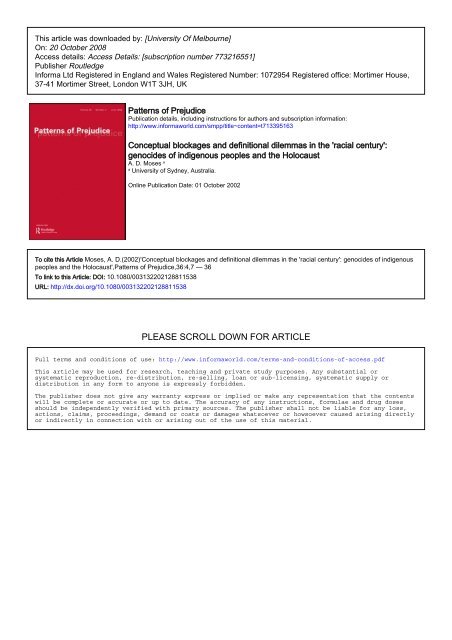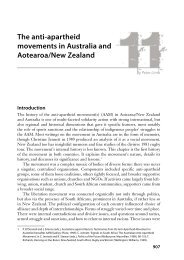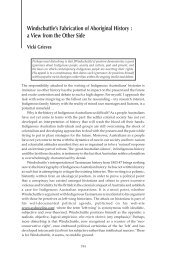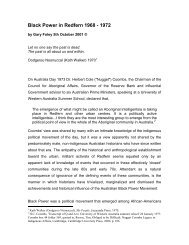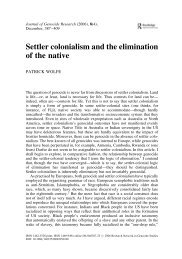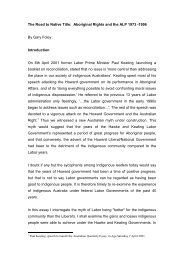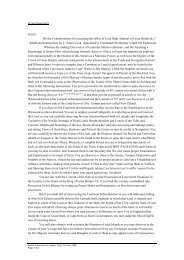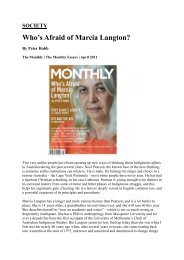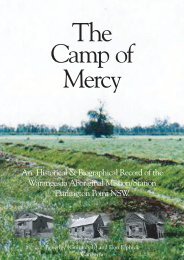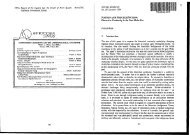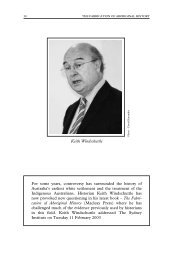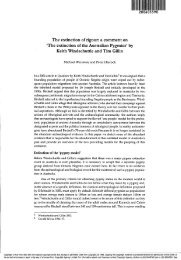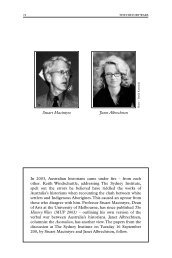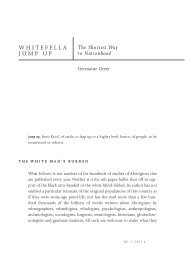Conceptual blockages and definitional dilemmas in the 'racial century'
Conceptual blockages and definitional dilemmas in the 'racial century'
Conceptual blockages and definitional dilemmas in the 'racial century'
You also want an ePaper? Increase the reach of your titles
YUMPU automatically turns print PDFs into web optimized ePapers that Google loves.
This article was downloaded by: [University Of Melbourne]On: 20 October 2008Access details: Access Details: [subscription number 773216551]Publisher RoutledgeInforma Ltd Registered <strong>in</strong> Engl<strong>and</strong> <strong>and</strong> Wales Registered Number: 1072954 Registered office: Mortimer House,37-41 Mortimer Street, London W1T 3JH, UKPatterns of PrejudicePublication details, <strong>in</strong>clud<strong>in</strong>g <strong>in</strong>structions for authors <strong>and</strong> subscription <strong>in</strong>formation:http://www.<strong>in</strong>formaworld.com/smpp/title~content=t713395163<strong>Conceptual</strong> <strong>blockages</strong> <strong>and</strong> <strong>def<strong>in</strong>itional</strong> <strong>dilemmas</strong> <strong>in</strong> <strong>the</strong> <strong>'racial</strong> <strong>century'</strong>:genocides of <strong>in</strong>digenous peoples <strong>and</strong> <strong>the</strong> HolocaustA. D. Moses aaUniversity of Sydney, Australia.Onl<strong>in</strong>e Publication Date: 01 October 2002To cite this Article Moses, A. D.(2002)'<strong>Conceptual</strong> <strong>blockages</strong> <strong>and</strong> <strong>def<strong>in</strong>itional</strong> <strong>dilemmas</strong> <strong>in</strong> <strong>the</strong> <strong>'racial</strong> <strong>century'</strong>: genocides of <strong>in</strong>digenouspeoples <strong>and</strong> <strong>the</strong> Holocaust',Patterns of Prejudice,36:4,7 — 36To l<strong>in</strong>k to this Article: DOI: 10.1080/003132202128811538URL: http://dx.doi.org/10.1080/003132202128811538PLEASE SCROLL DOWN FOR ARTICLEFull terms <strong>and</strong> conditions of use: http://www.<strong>in</strong>formaworld.com/terms-<strong>and</strong>-conditions-of-access.pdfThis article may be used for research, teach<strong>in</strong>g <strong>and</strong> private study purposes. Any substantial orsystematic reproduction, re-distribution, re-sell<strong>in</strong>g, loan or sub-licens<strong>in</strong>g, systematic supply ordistribution <strong>in</strong> any form to anyone is expressly forbidden.The publisher does not give any warranty express or implied or make any representation that <strong>the</strong> contentswill be complete or accurate or up to date. The accuracy of any <strong>in</strong>structions, formulae <strong>and</strong> drug dosesshould be <strong>in</strong>dependently verified with primary sources. The publisher shall not be liable for any loss,actions, claims, proceed<strong>in</strong>gs, dem<strong>and</strong> or costs or damages whatsoever or howsoever caused aris<strong>in</strong>g directlyor <strong>in</strong>directly <strong>in</strong> connection with or aris<strong>in</strong>g out of <strong>the</strong> use of this material.
A. DIRK MOSES 7A. DIRK MOSES<strong>Conceptual</strong> <strong>blockages</strong> <strong>and</strong> <strong>def<strong>in</strong>itional</strong><strong>dilemmas</strong> <strong>in</strong> <strong>the</strong> ‘racial century’: genocidesof <strong>in</strong>digenous peoples <strong>and</strong> <strong>the</strong> HolocaustDownloaded By: [University Of Melbourne] At: 04:18 20 October 2008ABSTRACT Moses argues that <strong>the</strong> study of <strong>in</strong>digenous genocides <strong>and</strong> <strong>the</strong> Holocaust ismarred by dogmatically held positions of rival scholarly communities, reflect<strong>in</strong>g <strong>the</strong>genocidal traumas of <strong>the</strong> ethnic groups with which <strong>the</strong>y are closely associated. Inparticular, those who study genocides of <strong>in</strong>digenous peoples <strong>in</strong> colonial contexts(<strong>and</strong> many o<strong>the</strong>rs) object to <strong>the</strong> <strong>the</strong>sis of <strong>the</strong> Holocaust’s ‘uniqueness’ or‘s<strong>in</strong>gularity’ on <strong>the</strong> grounds that it overshadows ‘lesser’ or ‘<strong>in</strong>complete’ <strong>in</strong>digenousgenocides—if <strong>in</strong>deed <strong>the</strong>y are considered genocides at all—that are consideredmarg<strong>in</strong>al or even ‘primitive’, <strong>the</strong>reby re<strong>in</strong>forc<strong>in</strong>g hegemonic Eurocentrism. Theyclaim that <strong>the</strong> moral caché of <strong>in</strong>digenous survivors of colonialism is consequentlydim<strong>in</strong>ished <strong>in</strong> comparison to that of Jews. Such scholars counter that genocide lies at<strong>the</strong> core of western civilization, <strong>and</strong> some extend its mean<strong>in</strong>g to cover a wide varietyof phenomena, <strong>the</strong>reby rais<strong>in</strong>g <strong>the</strong> issue of def<strong>in</strong>ition. These positions are reflected<strong>in</strong> <strong>the</strong> two schools of thought regard<strong>in</strong>g genocide: liberals who emphasize<strong>in</strong>tentionality <strong>and</strong> agency, <strong>and</strong> post-liberals who highlight impersonal structures <strong>and</strong>processes. The question almost raises itself: should <strong>the</strong> victim’s po<strong>in</strong>t of view beauthoritative <strong>in</strong> this regard, when different victim groups make <strong>in</strong>commensurable,<strong>in</strong>deed compet<strong>in</strong>g, claims? If we are to move beyond this unproductive <strong>in</strong>tellectual<strong>and</strong> moral stalemate, rehears<strong>in</strong>g <strong>the</strong> now familiar arguments is <strong>in</strong>sufficient. A criticalperspective that transcends that of victims <strong>and</strong> perpetrators <strong>and</strong> <strong>the</strong>ir descendants isclearly necessary. Moses argues that lay<strong>in</strong>g bare <strong>the</strong> group traumas that blockconceptual development <strong>and</strong> mutual recognition can aid <strong>in</strong> <strong>the</strong>ir be<strong>in</strong>g workedthrough, as well as <strong>in</strong> stimulat<strong>in</strong>g <strong>the</strong> critical reflection needed to reth<strong>in</strong>k <strong>the</strong>relationship between <strong>the</strong> Holocaust <strong>and</strong> <strong>the</strong> <strong>in</strong>digenous genocides that preceded it.Such a perspective can transcend liberal <strong>and</strong> post-liberal positions if it l<strong>in</strong>ks <strong>the</strong>colonial genocides of <strong>the</strong> ‘racial century’ (1850–1950) <strong>and</strong> <strong>the</strong> Holocaust to a s<strong>in</strong>glemodernization process of accelerat<strong>in</strong>g violence related to nation-build<strong>in</strong>g thatcommenced <strong>in</strong> <strong>the</strong> European colonial periphery <strong>and</strong> culm<strong>in</strong>ated <strong>in</strong> <strong>the</strong> Holocaust.KEYWORDS colonialism, genocide, Holocaust, <strong>in</strong>digenous people, modernity,racial centuryThe author is grateful to Adrian Carton, Robert Cribb, Ned Curthoys, John Docker, NickDoumanis, Geoff Eley, Andrew Fitzmaurice, Max Friedman, Simone Gigliotti, Mart<strong>in</strong> Jay, MarkLevene, Ben Kiernan, Amelia Kle<strong>in</strong>, Konrad Kwiet, Geoffrey Brahm Levey, Ken Macnab, LawrenceMcNamara, Sam Moyn, Glenda Sluga, Ulrich Speck, Dan Stone, Eric Weitz <strong>and</strong> JürgenZimmerer for encouragement, references <strong>and</strong> constructive criticisms of earlier drafts. They arenei<strong>the</strong>r responsible for <strong>the</strong> views expressed here nor, of course, for any errors. I also thank DelwynElizabeth for her able research assistance, which was funded by <strong>the</strong> University of Sydney.PATTERNS OF PREJUDICE © Institute for Jewish Policy Research, vol. 36, no. 4, 2002SAGE Publications (London, Thous<strong>and</strong> Oaks, New Delhi) 0031-322X/7–36/029696
8 Patterns of Prejudice 36:4But even regard<strong>in</strong>g History as <strong>the</strong> slaughter-bench at which <strong>the</strong> happ<strong>in</strong>ess of peoples,<strong>the</strong> wisdom of States, <strong>and</strong> <strong>the</strong> virtue of <strong>in</strong>dividuals have been victimized—<strong>the</strong>question <strong>in</strong>voluntarily arises—to what pr<strong>in</strong>ciple, to what aim, <strong>the</strong>se enormoussacrifices have been offered? 1Downloaded By: [University Of Melbourne] At: 04:18 20 October 2008Hegel was well aware of <strong>the</strong> terrible cost exacted by <strong>the</strong> march of civilization.Yet, precisely because <strong>the</strong> ‘History of <strong>the</strong> World is not <strong>the</strong> <strong>the</strong>atre ofhuman happ<strong>in</strong>ess’, as he put it ra<strong>the</strong>r coyly, Hegel felt compelled to develop aphilosophy of history that <strong>in</strong>vested cosmic mean<strong>in</strong>g <strong>in</strong> what o<strong>the</strong>rwise wouldbe an <strong>in</strong>tolerable spectacle of po<strong>in</strong>tless carnage. 2 He was <strong>the</strong>reby propos<strong>in</strong>g asecular ‘<strong>the</strong>odicy’, a term co<strong>in</strong>ed by <strong>the</strong> German philosopher G. W. Leibniz<strong>in</strong> 1710 to mean ‘justification of God’. 3In 1940, at <strong>the</strong> beg<strong>in</strong>n<strong>in</strong>g of a European catastrophe that would urgentlyre-pose <strong>the</strong> question of evil, <strong>the</strong> German-Jewish critic Walter Benjam<strong>in</strong> pouredscorn on <strong>the</strong>odicies because <strong>the</strong>y necessarily view <strong>the</strong> past through <strong>the</strong> eyes ofits victors <strong>and</strong> retrospectively justify <strong>the</strong>ir actions <strong>and</strong> morality. Could <strong>the</strong>European civilization that produced colonial violence <strong>and</strong> <strong>the</strong> First WorldWar be <strong>the</strong> greater good that redeemed <strong>the</strong> immeasurable suffer<strong>in</strong>g it caused?‘There is no document of civilization which is not at <strong>the</strong> same time a documentof barbarism’, Benjam<strong>in</strong> wrote famously <strong>in</strong> his ‘Theses on <strong>the</strong> philosophyof history’. 4 Ra<strong>the</strong>r than cont<strong>in</strong>ue <strong>the</strong> destruction wrought by such barbarism,he urged ‘anamnestic solidarity’ with its victims as a way of <strong>in</strong>terrupt<strong>in</strong>g <strong>the</strong>supposedly <strong>in</strong>eluctable <strong>and</strong> necessary ‘progress’ of civilization. 5Benjam<strong>in</strong>’s plea for <strong>the</strong> primacy of <strong>the</strong> victims’ po<strong>in</strong>t of view has certa<strong>in</strong>lybeen absorbed by <strong>the</strong> scholarly community that studies genocides. ButHegel, or at least <strong>the</strong>odicy, still comm<strong>and</strong>s a follow<strong>in</strong>g, for <strong>the</strong> enquiry <strong>in</strong>to<strong>the</strong> exterm<strong>in</strong>ation of so-called native or <strong>in</strong>digenous peoples cont<strong>in</strong>ues to beovershadowed by <strong>the</strong> nationalistic <strong>and</strong> totalitarian ‘cleans<strong>in</strong>g’ programmes of<strong>the</strong> twentieth century, particularly <strong>the</strong> Holocaust. Mark Mazower suggeststwo reasons for this low priority:I th<strong>in</strong>k <strong>the</strong>re may have . . . been a widely-held unspoken assumption that <strong>the</strong> masskill<strong>in</strong>g of African or American peoples was distant <strong>and</strong> <strong>in</strong> some senses an ‘<strong>in</strong>evitable’part of progress while what was genu<strong>in</strong>ely shock<strong>in</strong>g was <strong>the</strong> attempt to1 G. W. F. Hegel, The Philosophy of History (New York: Dover 1956), 14.2 Hegel, 26.3 Zachary Braiterman <strong>in</strong>correctly asserts that Leibniz co<strong>in</strong>ed <strong>the</strong> term ‘after an earthquakedevastated Lisbon <strong>in</strong> 1755’, but Le<strong>in</strong>iz died <strong>in</strong> 1716!: Z. Braiterman, (God) after Auschwitz(Pr<strong>in</strong>ceton, NJ: Pr<strong>in</strong>ceton University Press 1998), 19.4 Walter Benjam<strong>in</strong>, ‘Theses on <strong>the</strong> philosophy of history’, <strong>in</strong> W. Benjam<strong>in</strong>, Illum<strong>in</strong>ations, ed.Hannah Arendt (New York: Schocken Books 1969), 256. Michael Löwy, ‘Revolution aga<strong>in</strong>st“progress”: Walter Benjam<strong>in</strong>’s romantic anarchism’, New Left Review, no. 152, July–August1985.5 For an analysis of <strong>the</strong> concept of ‘anamnestic solidarity’ <strong>and</strong> its appropriation, see Max Pensky,‘On <strong>the</strong> use <strong>and</strong> abuse of memory: Habermas, “anamnestic solidarity”, <strong>and</strong> <strong>the</strong> Historikerstreit’,Philosophy <strong>and</strong> Social Criticism, vol. 15, no. 4, 1989, 351–81.
A. DIRK MOSES 9exterm<strong>in</strong>ate an entire people <strong>in</strong> Europe. This assumption may rest upon an implicitracism, or simply upon a failure of historical imag<strong>in</strong>ation. 6Downloaded By: [University Of Melbourne] At: 04:18 20 October 2008Ano<strong>the</strong>r reason is <strong>the</strong> fact that <strong>the</strong> nation-states of ‘<strong>the</strong> West’, which areresponsible for uphold<strong>in</strong>g human rights <strong>and</strong> <strong>the</strong> moral universalism on which<strong>the</strong>y are based, profitted enormously from imperialism, <strong>and</strong> often owe <strong>the</strong>irvery existence to <strong>the</strong>ir projects of settlement. The genocides of <strong>in</strong>digenouspeoples by colonial powers <strong>and</strong> settlers necessarily pose thorny questionstoday regard<strong>in</strong>g <strong>the</strong> dark past or provenance of <strong>the</strong>se societies. 7 Then <strong>the</strong>re is<strong>the</strong> prosaic problem that very few scholars dispose over sufficient knowledgeto make plausible comparisons <strong>and</strong> l<strong>in</strong>kages between different genocidal episodes.The upshot is that <strong>the</strong> genocide of European peoples <strong>in</strong> <strong>the</strong> twentiethcentury strikes many American, Anglo-European <strong>and</strong> Israeli scholars as amore urgent research question than <strong>the</strong> genocide of non-Europeans by Europeans<strong>in</strong> <strong>the</strong> preced<strong>in</strong>g centuries or by postcolonial states of <strong>the</strong>ir <strong>in</strong>digenouspopulations today. 8Underly<strong>in</strong>g this asymmetry is <strong>the</strong> claim that <strong>the</strong> Holocaust is ‘unique’,‘unprecedented’ or ‘s<strong>in</strong>gular’. Its implications for <strong>the</strong> study of <strong>in</strong>digenousgenocide are as significant as <strong>the</strong>y are dire: that such ‘lesser’ or ‘<strong>in</strong>complete’genocides—if <strong>in</strong>deed <strong>the</strong>y are considered genocides at all—are marg<strong>in</strong>al oreven ‘primitive’, <strong>the</strong>reby re<strong>in</strong>forc<strong>in</strong>g hegemonic Eurocentrism; 9 <strong>and</strong> that <strong>the</strong>moral caché of <strong>the</strong> <strong>in</strong>digenous survivors of colonialism is less than that ofJews. Predictably, <strong>the</strong>y are rejected by some scholars who counter that genocidelies at <strong>the</strong> core of western civilization, 10 <strong>and</strong> by o<strong>the</strong>rs who extend itsmean<strong>in</strong>g to a wide variety of phenomena, for example, to a European <strong>in</strong>terest<strong>in</strong> <strong>in</strong>digenous spirituality, birth control for African Americans, disease <strong>in</strong>Hawaii <strong>and</strong> <strong>the</strong> murder of street children <strong>in</strong> South American city slums. 116 Mark Mazower, ‘After Lemk<strong>in</strong>: genocide, <strong>the</strong> Holocaust <strong>and</strong> history’, Jewish Quarterly, vol.5, w<strong>in</strong>ter 1994, 5–8.7 For useful surveys of issues surround<strong>in</strong>g genocide <strong>and</strong> <strong>in</strong>digenous peoples today, see RobertT. Hitchcock <strong>and</strong> Tara M. Twedt, ‘Physical <strong>and</strong> cultural genocide of various <strong>in</strong>digenouspeoples’, <strong>in</strong> Samuel Totten, William S. Parsons <strong>and</strong> Israel W. Charny (eds), Genocide <strong>in</strong> <strong>the</strong>Twentieth Century (New York <strong>and</strong> London: Garl<strong>and</strong> Press 1995), 483–514; Ka<strong>the</strong>r<strong>in</strong>eBischop<strong>in</strong>g <strong>and</strong> Natalie F<strong>in</strong>gerhut, ‘Border l<strong>in</strong>es: <strong>in</strong>digenous peoples <strong>in</strong> genocide studies’,Canadian Review of Sociology <strong>and</strong> Anthropology, vol. 33, no. 4, 1996, 481–506; John H. Bodley,Victims of Progress (Menlo Park, CA: Cumm<strong>in</strong>gs 1975).8 Ziaudd<strong>in</strong> Sardar, Ashis N<strong>and</strong>y <strong>and</strong> Merryl Wyn Davies, Barbaric O<strong>the</strong>rs: A Manifesto onWestern Racism (London <strong>and</strong> Boulder, CO: Pluto Press 1993); Donald Bloxham <strong>and</strong> TonyKushner, ‘Exhibit<strong>in</strong>g racism: cultural imperialism, genocide <strong>and</strong> representation’, Reth<strong>in</strong>k<strong>in</strong>gHistory, vol. 2, no. 3, 1998, 349–58.9 Scott L. Montgomery, ‘What k<strong>in</strong>d of memory? Reflections on images of <strong>the</strong> Holocaust’, Contention,vol. 5, no. 1, autumn 1995, 101.10 Native American scholar <strong>and</strong> activist Ward Churchill goes so far as to claim that <strong>the</strong> uniquenessargument is tantamount to <strong>the</strong> denial of <strong>in</strong>digenous genocides; <strong>in</strong>deed, that it is worse,because it dovetails with <strong>the</strong> exculpatory imperatives of colonial-national governments at <strong>the</strong>expense of <strong>the</strong>ir impotent <strong>in</strong>digenous m<strong>in</strong>orities, <strong>and</strong> is purveyed by those with <strong>in</strong>stitutionalpower: A Little Matter of Genocide (San Francisco: City Lights Books 1997), 31–6, 50.11 Bron Taylor, ‘Ear<strong>the</strong>n spirituality or cultural genocide? Radical environmentalism’s appropriationof native spirituality’, Religion, vol. 27, 1997, 183–215; Simone M. Caron, ‘Birthcontrol <strong>and</strong> <strong>the</strong> black community <strong>in</strong> <strong>the</strong> 1960s: genocide or power politics?’, Journal of Social
10 Patterns of Prejudice 36:4Downloaded By: [University Of Melbourne] At: 04:18 20 October 2008‘The co<strong>in</strong>age has been debased’, observes Michael Ignatieff with exasperation:‘What rema<strong>in</strong>s is not a moral universal which b<strong>in</strong>ds us all toge<strong>the</strong>r, but aloose slogan which drives us apart.’ 12 Identity politics <strong>and</strong> academic enquiryare often conflated <strong>in</strong> polemical expressions of group trauma, <strong>and</strong> rancoursets <strong>the</strong> tone. The question almost raises itself: should <strong>the</strong> victim’s po<strong>in</strong>t ofview be authoritative <strong>in</strong> this field when different victim groups make <strong>in</strong>commensurable,<strong>in</strong>deed compet<strong>in</strong>g, claims? 13If we are to move beyond this unproductive <strong>in</strong>tellectual <strong>and</strong> moralstalemate, rehears<strong>in</strong>g <strong>the</strong> now familiar arguments is <strong>in</strong>sufficient. 14 A criticalperspective that transcends that of victims (articulated by Benjam<strong>in</strong>) <strong>and</strong> perpetrators<strong>and</strong> <strong>the</strong>ir descendants (advanced by Hegel) is clearly necessary.Whe<strong>the</strong>r it can be done with sensitivity is a question I am not <strong>in</strong> a position toanswer. One method has been undertaken by <strong>the</strong> anthropologist MichaelTaussig. Turn<strong>in</strong>g to Benjam<strong>in</strong> for <strong>in</strong>spiration, he <strong>in</strong>vokes <strong>the</strong> presentationalstrategy of montage to disrupt <strong>the</strong> normative status of <strong>the</strong> given order, plac<strong>in</strong>gstress not on ‘facts <strong>and</strong> <strong>in</strong>formation <strong>in</strong> w<strong>in</strong>n<strong>in</strong>g arguments . . . [but] . . . <strong>the</strong> lessconscious image realm <strong>and</strong> <strong>in</strong> <strong>the</strong> dreamworld of <strong>the</strong> popular imag<strong>in</strong>ation’. 15But what if <strong>the</strong> popular imag<strong>in</strong>ation is hopelessly divided about <strong>the</strong> identityof <strong>the</strong> ‘real’ victims of history or <strong>the</strong> hierarchy of <strong>the</strong>ir suffer<strong>in</strong>g? 16 In thatcase, an approach that lays bare <strong>the</strong> group traumas block<strong>in</strong>g conceptual development<strong>and</strong> mutual recognition can aid <strong>in</strong> <strong>the</strong>ir work<strong>in</strong>g through, as well as <strong>in</strong>stimulat<strong>in</strong>g <strong>the</strong> critical reflection needed to reth<strong>in</strong>k <strong>the</strong> relationship between<strong>the</strong> Holocaust <strong>and</strong> <strong>the</strong> <strong>in</strong>digenous genocides that preceded it. 17Trauma, <strong>the</strong> sacred <strong>and</strong> <strong>the</strong> profaneWhat is at stake <strong>in</strong> <strong>the</strong> ‘uniqueness’ question? In order to grasp its existentialimportance, it is necessary to appreciate that <strong>the</strong> events of <strong>the</strong> Holocaust wereexperienced by members of <strong>the</strong> victim group as a trauma of virtually metaphysicalproportions, a def<strong>in</strong><strong>in</strong>g rupture <strong>in</strong> personal <strong>and</strong> collective identityHistory, vol. 31, no. 3, 1998, 545–69; O. A. Bushnell, The Gifts of Civilisation: Germs <strong>and</strong>Genocide <strong>in</strong> Hawai‘i (Honolulu: University of Hawaii Press 1993); Nancy Scheper-Hughes,‘Small wars <strong>and</strong> <strong>in</strong>visible genocides’, Social Science <strong>and</strong> Medic<strong>in</strong>e, vol. 43, no. 5, 1996, 889–900.12 Michael Ignatieff, preface, <strong>in</strong> Simon Norfolk, For Most of It I Have No Words (London:Dewi Lewis 1998).13 Arlene Ste<strong>in</strong>, ‘Whose memories? Whose victimhood? Contests for <strong>the</strong> Holocaust frame <strong>in</strong>recent social movement discourse’, Sociological Perspective, vol. 4, no. 3, autumn 1998, 519–41.14 The relevant arguments have been analysed thoroughly <strong>in</strong> two recent publications: GavrielD. Rosenfeld, ‘The politics of uniqueness: reflections on <strong>the</strong> recent polemical turn <strong>in</strong> Holocaust<strong>and</strong> genocide scholarship’, Holocaust <strong>and</strong> Genocide Studies, vol. 13, no. 1, 1999, 28–61;Alan S. Rosenbaum (ed.), Is <strong>the</strong> Holocaust Unique?, 2nd edn (Boulder, CO: Westview Press2001).15 Michael Taussig, Shamanism, Colonialism, <strong>and</strong> <strong>the</strong> Wild Man (Chicago <strong>and</strong> London: Universityof Chicago Press 1987), 368f.16 Ka<strong>the</strong>r<strong>in</strong>e Bischop<strong>in</strong>g <strong>and</strong> Andrea Kalm<strong>in</strong>, ‘Public op<strong>in</strong>ion about comparisons to <strong>the</strong> Holocaust’,Public Op<strong>in</strong>ion Quarterly, vol. 63, no. 4, w<strong>in</strong>ter 1999, 485.17 Dom<strong>in</strong>ick LaCapra, Writ<strong>in</strong>g History, Writ<strong>in</strong>g Trauma (Baltimore <strong>and</strong> London: Johns Hopk<strong>in</strong>sUniversity Press 2001).
A. DIRK MOSES 11Downloaded By: [University Of Melbourne] At: 04:18 20 October 2008with world-historical significance. Many Jews, especially <strong>the</strong> direct survivors,accord<strong>in</strong>gly treat this genocide as sacred, 18 <strong>and</strong> it has become an importantmarker of collective Jewish identity, 19 notwithst<strong>and</strong><strong>in</strong>g considerable discomfort<strong>in</strong> that community with such a heteronomous determ<strong>in</strong>ation. 20Emile Durkheim’s <strong>the</strong>ory of <strong>the</strong> sacred provides a useful tool for underst<strong>and</strong><strong>in</strong>gthis phenomenon. Group identity, he wrote, is constituted by a sharedsense of <strong>the</strong> basic division of <strong>the</strong> world <strong>in</strong>to two doma<strong>in</strong>s, <strong>the</strong> sacred <strong>and</strong> <strong>the</strong>profane. The former comprises objects <strong>and</strong> events that are loved, venerated ordreaded, <strong>and</strong> that are superior <strong>in</strong> dignity to <strong>the</strong> ord<strong>in</strong>ary world of <strong>the</strong> profane.This division implies an obvious hierarchy: <strong>the</strong> sacred is special, <strong>and</strong> <strong>the</strong> profaneis not. Without a shared sense of <strong>the</strong> sacred, group identity would dissolve.But preserv<strong>in</strong>g <strong>the</strong> sacred status of certa<strong>in</strong> objects <strong>and</strong> events is not only amatter of communal survival; it is a response to suffer<strong>in</strong>g. For <strong>the</strong> cosmicorder provided by <strong>the</strong> sacred–profane division endows <strong>the</strong> survivor of traumawith ‘more force ei<strong>the</strong>r to endure <strong>the</strong> trials of existence or to conquer <strong>the</strong>m’. 21Durkheim’s analysis also helps expose o<strong>the</strong>r aspects of <strong>the</strong> Holocaust’ssacredness. He calls <strong>the</strong> group’s most holy th<strong>in</strong>g or object its ‘totem’, <strong>the</strong>sacred aura of which extends to two fur<strong>the</strong>r doma<strong>in</strong>s: <strong>the</strong> sign or representationof <strong>the</strong> totem, <strong>and</strong> <strong>the</strong> members of <strong>the</strong> clan (Durkheim had <strong>in</strong> m<strong>in</strong>d<strong>in</strong>digenous Australians) who comprise <strong>the</strong> core of <strong>the</strong> community. 22 On thisaccount, <strong>the</strong> survivors <strong>the</strong>mselves assume a sacred status, <strong>and</strong> it is no surprisethat <strong>the</strong>y also vigilantly guard representations of <strong>the</strong> Holocaust lest it be defiledor contam<strong>in</strong>ated. 23 This endeavour is necessarily sectarian. F<strong>in</strong>ally, <strong>the</strong> Holocaustis read as a negative cult, a piaculum, as Durkheim would have it: <strong>the</strong>commemoration of a calamity, that is, a trauma. 24 Utiliz<strong>in</strong>g <strong>the</strong> literature ontrauma, <strong>the</strong> historian Dom<strong>in</strong>ick LaCapra has come to similar conclusions:18 Adi Ophir, ‘On sanctify<strong>in</strong>g <strong>the</strong> Holocaust: an anti-<strong>the</strong>ological treatise’, Tikkun, vol. 2, no. 1,1987, 61–7. Ophir calls it ‘a new religion’ with its own comm<strong>and</strong>ments: ‘Thou shalt have noo<strong>the</strong>r holocaust’; ‘Thou shalt not make unto <strong>the</strong>e any graven image or likeness’; ‘Thou shaltnot take <strong>the</strong> name <strong>in</strong> va<strong>in</strong>’; <strong>and</strong> ‘Remember <strong>the</strong> day of <strong>the</strong> Holocaust to keep it holy, <strong>in</strong> memoryof <strong>the</strong> destruction of <strong>the</strong> Jews of Europe’. Cf. Mark Levene, ‘Is <strong>the</strong> Holocaust simply ano<strong>the</strong>rexample of genocide?’, Patterns of Prejudice, vol. 28, no. 2, 1994, 6.19 Peter Novick, The Holocaust <strong>in</strong> American Life (New York: Houghton Miffl<strong>in</strong> 1999). Forcritical discussion, see Harold Kaplan, ‘Americaniz<strong>in</strong>g <strong>the</strong> Holocaust’, <strong>in</strong> John K. Roth <strong>and</strong>Elisabeth Maxwell (eds), Remember<strong>in</strong>g for <strong>the</strong> Future, vol. 1 (London: Palgrave 2001), 309–21; <strong>and</strong> Berel Lang, ‘On Peter Novick’s The Holocaust <strong>in</strong> American Life’, Jewish Social Studies,vol. 7, no. 3, 2001, 149–58.20 For a plea that <strong>the</strong> Holocaust not become ‘<strong>the</strong> crucible of [Jewish] culture’, see David G.Roskies, Aga<strong>in</strong>st <strong>the</strong> Apocalypse: Responses to Catastrophe <strong>in</strong> Modern Jewish Culture (Cambridge,MA: Harvard University Press 1984), 9. See also Michael André Bernste<strong>in</strong>, ForegoneConclusions: Aga<strong>in</strong>st Apocalyptic History (Berkeley: University of California Press 1994),10, 13.21 Emile Durkheim, The Elementary Forms of Religious Life (New York: Free Press 1915), 52–4, 142, 240, 464.22 Ibid., 140, 150ff.23 Witness <strong>the</strong> bitter protest of survivors aga<strong>in</strong>st <strong>the</strong> New York exhibition, ‘Mirror<strong>in</strong>g evil: Naziimagery/recent art’, which opened on 17 March 2002. See Walter Reich, ‘Appropriat<strong>in</strong>g <strong>the</strong>Holocaust’, New York Times, 15 March 2002, A23.24 Durkheim, 434ff.
12 Patterns of Prejudice 36:4Those traumatized by extreme events, as well as those empathiz<strong>in</strong>g with <strong>the</strong>m, mayresist work<strong>in</strong>g through because of what might almost be termed a fidelity to trauma,a feel<strong>in</strong>g that one must somehow keep faith with it . . . Moreover . . . <strong>the</strong>re has beenan important tendency <strong>in</strong> modern culture <strong>and</strong> thought to convert trauma <strong>in</strong>to <strong>the</strong>occasion for sublimity, to transvalue it <strong>in</strong>to a test for <strong>the</strong> self or <strong>the</strong> group <strong>and</strong> anentry <strong>in</strong>to <strong>the</strong> extraord<strong>in</strong>ary . . . Even extremely destructive or disorient<strong>in</strong>g events,such as <strong>the</strong> Holocaust or <strong>the</strong> dropp<strong>in</strong>g of <strong>the</strong> bombs on Hiroshima <strong>and</strong> Nagasakimay become occasions of negative sublimity or displaced sacralization. They mayalso give rise to what may be termed found<strong>in</strong>g traumas—traumas that paradoxicallybecome <strong>the</strong> valorized or <strong>in</strong>tensely ca<strong>the</strong>cted basis of identity for an <strong>in</strong>dividualor a group ra<strong>the</strong>r than events that pose <strong>the</strong> problematic question of identity. 25Downloaded By: [University Of Melbourne] At: 04:18 20 October 2008Of course, contemporary Jewish <strong>in</strong>dividual <strong>and</strong> religious identity precedes<strong>the</strong> Holocaust <strong>and</strong> cont<strong>in</strong>ues apart from it. Jewish identity is notautomatically Holocaust-centric. 26 Yet, for some <strong>in</strong>fluential contributors to<strong>the</strong> field, <strong>the</strong> Holocaust does <strong>in</strong> fact possess this status, due perhaps to <strong>the</strong>ircatholic <strong>in</strong>terest <strong>in</strong> <strong>the</strong> fate of all Jews, s<strong>in</strong>ce all Jews, irrespective of religiousor political hue, whe<strong>the</strong>r religious or secular, were potential victims of NationalSocialist designs. ‘I admit that my personal start<strong>in</strong>g po<strong>in</strong>t, my bias if you will’,confesses <strong>the</strong> historian Yehuda Bauer, ‘is formed by my overrid<strong>in</strong>g <strong>in</strong>terest <strong>in</strong><strong>the</strong> fate of <strong>the</strong> Jews’. 27 The Holocaust is <strong>the</strong> trauma that all Jews share <strong>and</strong> itfunctions <strong>the</strong>reby, George Ste<strong>in</strong>er observes, as <strong>the</strong> cement b<strong>in</strong>d<strong>in</strong>g post-HolocaustJewry. The Shoah (a term he prefers to ‘Holocaust’ because of itsconnotation of sacrifice), he writes,is <strong>the</strong> one <strong>and</strong> only bond which unites <strong>the</strong> Orthodox Jew <strong>and</strong> <strong>the</strong> a<strong>the</strong>ist, <strong>the</strong> practis<strong>in</strong>gJew <strong>and</strong> <strong>the</strong> total secularist, <strong>the</strong> people of Israel <strong>and</strong> <strong>the</strong> Diaspora, <strong>the</strong> Zionist<strong>and</strong> <strong>the</strong> anti-Zionist, <strong>the</strong> extreme conservative Jew . . . <strong>and</strong> <strong>the</strong> Jewish Trotskyite orCommunist. Above all else, to be a Jew <strong>in</strong> <strong>the</strong> second half of this century is to be asurvivor, <strong>and</strong> one who knows that his survival can aga<strong>in</strong> be put <strong>in</strong>to question . . . Weare, <strong>in</strong> certa<strong>in</strong> respects, a traumatised, a crazed people. How could we not be?Especially where it is that trauma which keeps us from f<strong>in</strong>al dispersal. 28Elie Wiesel has made <strong>the</strong> logical connection between trauma, group identity<strong>and</strong> <strong>the</strong> <strong>in</strong>sistence of uniqueness:I always forbade myself to compare <strong>the</strong> Holocaust of European Judaism to eventswhich are foreign to it. Auschwitz was someth<strong>in</strong>g else. The Universe of concentrationcamps, by its dimensions <strong>and</strong> its design, lies outside, if not beyond, history. Itsvocabulary belongs to it alone. 2925 LaCapra, 22–3.26 Space does not permit consider<strong>in</strong>g <strong>the</strong> differences between Jewish identity <strong>in</strong> different countries.27 Yehuda Bauer, ‘A past that will not go away’, <strong>in</strong> Michael Berenbaum <strong>and</strong> Abraham J. Peck(eds), The Holocaust <strong>and</strong> History (Bloom<strong>in</strong>gton: Indiana University Press 1998), 20. To besure, Bauer ma<strong>in</strong>ta<strong>in</strong>s, aga<strong>in</strong>st <strong>the</strong>ologians, that <strong>the</strong> Holocaust is ‘mean<strong>in</strong>gless’, but it none<strong>the</strong>lessrema<strong>in</strong>s for him a sacred event <strong>in</strong> <strong>the</strong> Durkheimian sense.28 George Ste<strong>in</strong>er, ‘The long life of metaphor: an approach to “<strong>the</strong> Shoah”’, Encounter, February1987, 57.29 Elie Wiesel, ‘Now we know’, <strong>in</strong> Richard Arens (ed.), Genocide <strong>in</strong> Paraguay (Philadelphia,PA: Temple University Press 1976), 165. To be sure, <strong>in</strong> <strong>the</strong> Paraguayan genocide of <strong>the</strong> Aches,
A. DIRK MOSES 13Accord<strong>in</strong>gly, he has expressed alarm that o<strong>the</strong>r victim groups are ‘steal<strong>in</strong>g <strong>the</strong>Holocaust from us . . . we need to rega<strong>in</strong> our sense of sacredness’. 30 Renownedscholars such as Lucy Dawidowicz, Steven T. Katz <strong>and</strong> Bauer do not differfrom Wiesel <strong>and</strong> survivors <strong>in</strong> this regard, even if <strong>the</strong>y locate <strong>the</strong> Holocaust <strong>in</strong>history. Bauer himself has po<strong>in</strong>ted out <strong>the</strong> traumatiz<strong>in</strong>g effect of <strong>the</strong> Holocauston Israeli society, demonstrated, above all, by its <strong>in</strong>strumentalization byall sides <strong>in</strong> public debate for partisan political purposes. 31 And with characteristicforthrightness Katz <strong>in</strong>sists on its centrality for Jewish identity:Downloaded By: [University Of Melbourne] At: 04:18 20 October 2008To underst<strong>and</strong> ourselves [as Jews] requires <strong>in</strong>eluctably that we come to some graspof <strong>the</strong>se events [<strong>the</strong> Holocaust] <strong>and</strong> our relation to <strong>the</strong>m . . . Those who wouldenquire what it means to be a Jew today must ask not, or even pose primarily,vague <strong>and</strong> unformed questions about Jewish identity <strong>and</strong> <strong>the</strong> relation of Judaism<strong>and</strong> modernity <strong>and</strong> Judaism <strong>and</strong> secularity, but must ra<strong>the</strong>r articulate <strong>the</strong> muchmore precise <strong>and</strong> focused question through which all o<strong>the</strong>r dimensions of our post-Holocaust identity are refracted <strong>and</strong> def<strong>in</strong>ed: ‘What does it mean to be a Jew afterAuschwitz?’ Auschwitz has become an <strong>in</strong>escapable datum for all Jewish accountsof <strong>the</strong> mean<strong>in</strong>g <strong>and</strong> nature of covenantal relation <strong>and</strong> God’s relation to man. Likewise,all substantial answers also need to be open <strong>and</strong> responsive to <strong>the</strong> subtleties of<strong>the</strong> dialectical alternation of <strong>the</strong> contemporary Jewish situation: that is, <strong>the</strong>y mustalso give due weight to <strong>the</strong> ‘miracle’ which is <strong>the</strong> state of Israel. They must thoughtfully<strong>and</strong> sensitively enquire whe<strong>the</strong>r God is speak<strong>in</strong>g to <strong>the</strong> ‘survivors’ through it,<strong>and</strong> if so how. 32Because Katz <strong>and</strong> Bauer locate <strong>the</strong> Holocaust at <strong>the</strong> centre of Jewish life, <strong>the</strong>yare forced to <strong>in</strong>sist on its uniqueness, for to do o<strong>the</strong>rwise would underm<strong>in</strong>e<strong>the</strong>ir personal identity <strong>and</strong> concept of collective Jewish existence. 33 The significanceKatz <strong>and</strong> Bauer attach to <strong>the</strong> Holocaust cannot be susta<strong>in</strong>ed if it is‘merely’ ano<strong>the</strong>r case of <strong>the</strong> mass kill<strong>in</strong>g that punctuates human history, for<strong>the</strong> problem of evil—<strong>the</strong> mystery of undeserved suffer<strong>in</strong>g—cannot be facedwithout <strong>the</strong> sense of a cosmic mean<strong>in</strong>g subtended by <strong>the</strong> division of <strong>the</strong> world<strong>in</strong>to sacred <strong>and</strong> profane doma<strong>in</strong>s. 34Wiesel recognizes <strong>the</strong> analogy: ‘it is <strong>in</strong>deed a matter of a F<strong>in</strong>al Solution: It simply aims atexterm<strong>in</strong>at<strong>in</strong>g this tribe’ (166).30 Quoted <strong>in</strong> Robert G. L. Waite, ‘The Holocaust <strong>and</strong> historical explanation’, <strong>in</strong> Isidor Wallimann<strong>and</strong> Michael N. Dobkowski (eds), Genocide <strong>and</strong> <strong>the</strong> Modern Age (Westport, CT: GreenwoodPress 1987), 169. Cf. Zev Garber <strong>and</strong> Bruce Zuckerman, ‘Why do we call <strong>the</strong> Holocaust “<strong>the</strong>Holocaust”?’, Modern Judaism, vol. 9, no. 2, 1989, 197–211.31 Yehuda Bauer, ‘We are condemned to remember’, Jerusalem Post, 19 April 2001. Bauerassumes <strong>the</strong> posture of <strong>the</strong> analyst.32 Steven T. Katz, Post-Holocaust Dialogues (New York <strong>and</strong> London: New York UniversityPress 1983), 142f. <strong>and</strong> <strong>the</strong> chapter ‘The “unique” <strong>in</strong>tentionality of <strong>the</strong> Holocaust’, 287–318. Cf.Yehuda Bauer, who makes <strong>the</strong> same po<strong>in</strong>t <strong>in</strong> ‘The place of <strong>the</strong> Holocaust <strong>in</strong> contemporaryhistory’, Studies <strong>in</strong> Contemporary Jewry, vol. 1, 1984, 224. Emil Fackenheim, ‘Why <strong>the</strong> Holocaustis unique’, Judaism, vol. 5, no. 4, autumn 2001, 438–47.33 Durkheim, 427–33, 462–79. Conversely, Jews that do not put <strong>the</strong> Holocaust at <strong>the</strong> centre ofJewish identity presumably do not have to <strong>in</strong>sist on its uniqueness.34 This po<strong>in</strong>t is elaborated <strong>in</strong> A. Dirk Moses, ‘Structure <strong>and</strong> agency <strong>in</strong> <strong>the</strong> Holocaust: Daniel J.Goldhagen <strong>and</strong> his critics’, History <strong>and</strong> Theory, vol. 37, no. 2, 1998, 194–219. See alsoBraiterman.
14 Patterns of Prejudice 36:4Downloaded By: [University Of Melbourne] At: 04:18 20 October 2008Consequently, both men have devoted considerable energy to establish<strong>in</strong>g<strong>the</strong> logical corollary of <strong>the</strong>ir implicit faith <strong>in</strong> <strong>the</strong> sacredness of <strong>the</strong>Holocaust, namely, <strong>the</strong> division of all genocide victims <strong>in</strong>to <strong>the</strong> same twocategories, sacred <strong>and</strong> profane. 35 Although <strong>the</strong>y profess not to posit a hierarchyof victims or to claim that <strong>in</strong>dividual Jewish victims suffered more thannon-Jewish ones, <strong>the</strong> burden of <strong>the</strong>ir argument none<strong>the</strong>less is that <strong>the</strong> Jewishvictims of <strong>the</strong> Holocaust are sacred, <strong>and</strong> that those of o<strong>the</strong>r genocides are not,because only <strong>the</strong> Jews as a group were s<strong>in</strong>gled out for total exterm<strong>in</strong>ation. 36For this reason, Bauer dismisses David E. Stannard’s claim of an ‘AmericanHolocaust’ (that is, of <strong>the</strong> Native Americans) with <strong>the</strong> tell<strong>in</strong>g statement that it‘cannot be seen on a par with <strong>the</strong> Holocaust’. 37Indeed, Bauer decries such equivalences as antisemitic. The temptationto ‘submerge <strong>the</strong> specific Jewish tragedy <strong>in</strong> <strong>the</strong> general sea of suffer<strong>in</strong>g causedby <strong>the</strong> many atrocities committed by <strong>the</strong> Nazi regime’, he fears, is <strong>in</strong> fact a‘worldwide phenomenon connected with dangers of anti-Semitism’. 38 Herewith,he acts out <strong>the</strong> two collective traumas of European Jewry: <strong>the</strong> suffer<strong>in</strong>gcaused by more than a millennium of Christian anti-Judaism (<strong>in</strong>clud<strong>in</strong>g <strong>the</strong>Holocaust), <strong>and</strong> <strong>the</strong> ‘second victimization’ through <strong>the</strong> ‘unspeakability’ of<strong>the</strong> Holocaust <strong>in</strong> <strong>the</strong> immediate post-war years. 39 Now only <strong>the</strong> memory of<strong>the</strong> Jewish Holocaust can prevent <strong>the</strong> flourish<strong>in</strong>g of <strong>the</strong> antisemitism that ledto <strong>the</strong> catastrophe <strong>in</strong> <strong>the</strong> first place: ‘A reversion back to “normalcy” regard<strong>in</strong>gJews requires <strong>the</strong> destruction of <strong>the</strong> Holocaust-caused attitude of sympathy’. 40Underst<strong>and</strong>able as this position is, it leaves Bauer open to <strong>the</strong> charge of NormanF<strong>in</strong>kelste<strong>in</strong> <strong>and</strong> denialists that he <strong>in</strong>strumentalizes <strong>the</strong> Holocaust to ga<strong>in</strong>a moral advantage for Jews. 41Certa<strong>in</strong>ly, Bauer has made a career not only of polic<strong>in</strong>g <strong>the</strong> compoundaround <strong>the</strong> Holocaust, but also of regulat<strong>in</strong>g its mean<strong>in</strong>g for Jewish selfunderst<strong>and</strong><strong>in</strong>g:all <strong>the</strong>se universaliz<strong>in</strong>g attempts [regard<strong>in</strong>g <strong>the</strong> Holocaust] seem to me to be, on <strong>the</strong>Jewish side, efforts by <strong>the</strong>ir authors to escape <strong>the</strong>ir Jewishness. They are expressions35 This observation is John M. Cuddihy’s <strong>in</strong> ‘The Holocaust: <strong>the</strong> latent issue <strong>in</strong> <strong>the</strong> uniquenessdebate’, <strong>in</strong> Philip F. Gallagher (ed.), Christians, Jews <strong>and</strong> O<strong>the</strong>r Worlds (London <strong>and</strong> NewYork: University Press of America 1988), 62–79.36 Steven T. Katz, The Holocaust <strong>in</strong> Historical Context, vol. 1 (New York: Oxford UniversityPress 1994). See also Steven T. Katz, ‘The Holocaust: a very particular racism’, <strong>in</strong> Berenbaum<strong>and</strong> Peck (eds), 56-63, <strong>in</strong> which Katz takes pa<strong>in</strong>s to dist<strong>in</strong>guish between <strong>the</strong> eugenic world-viewthat underlay Nazi policies towards all supposed racially <strong>in</strong>ferior people from anti-Jewishracism.37 Yehuda Bauer, ‘Comparison of genocides’, <strong>in</strong> Levon Chorbajian <strong>and</strong> George Shir<strong>in</strong>ian (eds),Studies <strong>in</strong> Contemporary Genocide (New York: St Mart<strong>in</strong>’s Press 1999), 33, emphasis added.38 Yehuda Bauer, ‘Whose Holocaust?’, <strong>in</strong> Jack Nusan Porter (ed.), Genocide <strong>and</strong> Human Rights:A Global Anthology (Lanham, MD: University Press of America 1982), 35, 38, repr<strong>in</strong>tedfrom Midstream, vol. 26, no. 9, November 1980.39 Jean-Michel Chaumont, Die Konkurrenz der Opfer: Genozid, Identiät und Aerkennung, trans.Thomas Laugste<strong>in</strong> (Lüneburg: Dietrich zu Klampen Verlag 2001). See also Gerd Korman,‘The Holocaust <strong>in</strong> American historical writ<strong>in</strong>g’, Societas, vol. 2, no. 3, 1972, 251–70.40 Bauer, ‘Whose Holocaust?’, 44.41 Norman F<strong>in</strong>kelste<strong>in</strong>, The Holocaust Industry (London <strong>and</strong> New York: Verso 1999).
A. DIRK MOSES 15of a deep-seated <strong>in</strong>security; <strong>the</strong>se people feel more secure when <strong>the</strong>y can say ‘weare just like all <strong>the</strong> o<strong>the</strong>rs’. The Holocaust should have proved to <strong>the</strong>m that <strong>the</strong>Jews were, unfortunately, not like <strong>the</strong> o<strong>the</strong>rs. Obviously it did not. 42Downloaded By: [University Of Melbourne] At: 04:18 20 October 2008The l<strong>in</strong>k between <strong>the</strong> ongo<strong>in</strong>g ma<strong>in</strong>tenance of group identity <strong>and</strong> <strong>the</strong> sacrednessof <strong>the</strong> Holocaust could hardly be made more explicitly than <strong>in</strong> thisextraord<strong>in</strong>ary statement.Even Bauer’s elucidation of <strong>the</strong> universal mean<strong>in</strong>g of <strong>the</strong> Holocaustdenies o<strong>the</strong>r victims of Nazi racial policies a place around its holy penumbra.The ‘unique situation of Jewry <strong>in</strong> Western culture’, he <strong>in</strong>sists, meant that italone was <strong>the</strong> object of fantasies of complete destruction; consequently, <strong>the</strong>specifically Jewish experience must be raised above all o<strong>the</strong>rs <strong>in</strong> order to serveas a general warn<strong>in</strong>g for all m<strong>in</strong>ority groups, s<strong>in</strong>ce <strong>the</strong>y too could one daysuffer a holocaust. 43 But this reason<strong>in</strong>g is muddled, because if <strong>the</strong> Jewish position<strong>in</strong> Europe was unique <strong>the</strong>n <strong>the</strong> likelihood of ano<strong>the</strong>r ethnic m<strong>in</strong>oritybecom<strong>in</strong>g <strong>the</strong> object of <strong>the</strong> same rhetoric of total exterm<strong>in</strong>ation is more thanhighly improbable. 44 In fact, <strong>the</strong> logical conclusion of <strong>the</strong> argument that <strong>the</strong>less-than-total, non-Jewish, profane genocides are much more common is that<strong>the</strong>y should be <strong>the</strong> focus of scholarly attention <strong>and</strong> public memory.To be sure, Bauer has developed his position over <strong>the</strong> years, now characteriz<strong>in</strong>g<strong>the</strong> Holocaust as ‘unprecedented’ ra<strong>the</strong>r than ‘unique’, <strong>and</strong> plead<strong>in</strong>gfor a ‘spectrum’ of genocides, with <strong>the</strong> Holocaust at one end as <strong>the</strong> mostextreme example of exterm<strong>in</strong>ation. His s<strong>in</strong>cere <strong>and</strong> generous advocacy on behalfof o<strong>the</strong>r victim groups is well known. 45 Yet, this concession to comparisondoes not alter significantly his consistently held belief s<strong>in</strong>ce <strong>the</strong> 1970s that <strong>the</strong>differences between <strong>the</strong> Holocaust <strong>and</strong> o<strong>the</strong>r genocides outweigh any similarities,<strong>and</strong> that <strong>the</strong> Holocaust is <strong>the</strong>reby special (or sacred). He appears toconfuse two, dist<strong>in</strong>ct tasks: on <strong>the</strong> one h<strong>and</strong>, reflect<strong>in</strong>g specifically on <strong>the</strong>burden of history <strong>and</strong> identity for post-Holocaust Jewry; on <strong>the</strong> o<strong>the</strong>r, expla<strong>in</strong><strong>in</strong>ggenerally how <strong>and</strong> why genocides occur. By collaps<strong>in</strong>g <strong>the</strong> latter <strong>in</strong>to <strong>the</strong>former, he ends up at times proffer<strong>in</strong>g identity politics <strong>in</strong> <strong>the</strong> name of dis<strong>in</strong>terestedscholarship.Both <strong>in</strong> his <strong>and</strong> Katz’s particular <strong>and</strong> universal render<strong>in</strong>g of <strong>the</strong> Holocaust,<strong>the</strong>n, <strong>the</strong> centrality of Jewish victims must be foregrounded lest itsmean<strong>in</strong>g be traduced. In order to ma<strong>in</strong>ta<strong>in</strong> <strong>the</strong> border between sacred <strong>and</strong>profane victims of genocide, <strong>the</strong>y have to downplay <strong>the</strong> similarities betweenall victims of genocide by referr<strong>in</strong>g, somewhat ironically, to Hitler’s own faith<strong>in</strong> <strong>the</strong> ‘redemptive’ act of kill<strong>in</strong>g all Jews, an unfortunate authority to which42 Bauer, ‘A past that will not go away’, 17.43 Ibid., 43; Yehuda Bauer, A History of <strong>the</strong> Holocaust (New York: Frankl<strong>in</strong> Watts 1982), 332.44 See Dan Stone, Construct<strong>in</strong>g <strong>the</strong> Holocaust: Genocide <strong>and</strong> History (London: Vallent<strong>in</strong>eMitchell, forthcom<strong>in</strong>g). Bauer, Reth<strong>in</strong>k<strong>in</strong>g <strong>the</strong> Holocaust (New Haven: Yale University Press,2001), ch. 3: ‘Comparisons with o<strong>the</strong>r genocides’; <strong>and</strong> Yehuda Bauer, ‘Plenary address’, <strong>in</strong>Roth <strong>and</strong> Maxwell (eds), 21–4.45 Bauer is an active member of <strong>the</strong> Elmau Initiative: An International Taskforce to PreventGenocide.
16 Patterns of Prejudice 36:4Downloaded By: [University Of Melbourne] At: 04:18 20 October 2008to appeal. 46 The po<strong>in</strong>t of draw<strong>in</strong>g attention to <strong>the</strong>ir strategies, however, is notto dispute <strong>the</strong> fact that <strong>the</strong> Holocaust can be dist<strong>in</strong>guished from o<strong>the</strong>r genocides<strong>in</strong> important respects. It is to note <strong>in</strong> this field of enquiry that grouptrauma is acted out <strong>in</strong> truculently held <strong>in</strong>tellectual positions whose articulatorsare prepared to climb out on very th<strong>in</strong> limbs to make <strong>the</strong>ir cases.As might be expected, <strong>the</strong> uniqueness argument is a particular ana<strong>the</strong>mato members of <strong>the</strong> victim groups it consigns to profane status. 47 Historians from<strong>the</strong>se groups have responded <strong>in</strong> three ways. First, <strong>the</strong>y question whe<strong>the</strong>r <strong>the</strong>rewas <strong>in</strong> fact a Nazi will for total exterm<strong>in</strong>ation of Jews, <strong>the</strong>reby desanctify<strong>in</strong>gJewish victims. 48 Second, <strong>the</strong>y claim that <strong>the</strong> Holocaust was a copy of <strong>the</strong> massexterm<strong>in</strong>ations that had already taken place <strong>in</strong> <strong>the</strong> European colonies, thusclaim<strong>in</strong>g priority for such genocides. ‘In fact, <strong>the</strong> holocaust of North Americantribes was, <strong>in</strong> a way, even more destructive than that of <strong>the</strong> Jews’, claims RussellThornton provocatively, ‘s<strong>in</strong>ce many American Indian peoples became ext<strong>in</strong>ct’. 49A third argument substitutes total regularity for absolute uniqueness: ‘QueenElizabeth, K<strong>in</strong>g Ferd<strong>in</strong><strong>and</strong>, Queen Victoria, K<strong>in</strong>g Louis <strong>and</strong> so on were <strong>the</strong>“Adolf Hitler’s” [sic] of <strong>the</strong>ir day’, a collective of Canadian authors suppose.‘“Auschwitz” was an everyday reality for many people across <strong>the</strong> world dur<strong>in</strong>g<strong>the</strong> years of colonialism <strong>and</strong> <strong>the</strong> years that followed.’ 50 The <strong>in</strong>dignation stemsfrom <strong>the</strong> fact that Native American deaths are considered ‘unworthy’ because<strong>the</strong>y died at <strong>the</strong> h<strong>and</strong>s of ‘our very own [white] forebears’, as Stannard notes:that is why <strong>the</strong>re is no Holocaust Memorial for Native Americans or o<strong>the</strong>rvictims. 51 This is a tell<strong>in</strong>g po<strong>in</strong>t, for most American public leaders <strong>and</strong> <strong>in</strong>tellectualsare happy to pontificate about genocide <strong>in</strong> every country but <strong>the</strong>ir own. 5246 Cuddihy, 72.47 It is also <strong>the</strong> object of attack by Jewish scholars. Ismar Schorsch warns that <strong>the</strong> <strong>in</strong>sistence ofuniqueness ‘impedes genu<strong>in</strong>e dialogue, because it <strong>in</strong>troduces an extraneous, contentious issuethat alienates political allies from among o<strong>the</strong>r victims of organized human depravity’: ‘TheHolocaust <strong>and</strong> Jewish survival’, Midstream, vol. 17, no. 1, January 1981, 39. Steven T. Katzattempts a refutation <strong>in</strong> his The Holocaust <strong>in</strong> Historical Context, 39–42; David Biale criticallyreviews Katz <strong>and</strong> attacks <strong>the</strong> uniqueness <strong>the</strong>sis <strong>in</strong> Tikkun, vol. 10, no. 1, January–February1995, 79–82. See also <strong>the</strong> differentiated discussion by Irv<strong>in</strong>g L. Horowitz, ‘Genocide <strong>and</strong> <strong>the</strong>reconstruction of social <strong>the</strong>ory’, <strong>in</strong> Wallimann <strong>and</strong> Dobkowski (eds), 61–80.48 Ian Hancock, ‘Uniqueness as denial: <strong>the</strong> politics of genocide scholarship’, <strong>in</strong> Rosenbaum (ed.),163–208. Hancock is greatly irritated by Bauer’s contention that Gypsies represented only a‘m<strong>in</strong>or irritant’ for <strong>the</strong> Nazis.49 Russell Thornton, American Indian Holocaust <strong>and</strong> Survival (Norman <strong>and</strong> London: Universityof Oklahoma Press 1987), xvi; M. Annette Jaimes, ‘S<strong>and</strong> Creek: <strong>the</strong> morn<strong>in</strong>g after’, <strong>in</strong> M.Annette Jaimes (ed.), The State of Native America (Boston: South End Press 1992), 1–12;Churchill, A Little Matter of Genocide; David E. Stannard, American Holocaust (New York<strong>and</strong> Oxford: Oxford University Press 1992), 255.50 Antoon A. Leenaars et al., ‘Genocide <strong>and</strong> suicide among <strong>in</strong>digenous people: <strong>the</strong> North meets<strong>the</strong> South’, Canadian Journal of Native Studies, vol. 19, no. 2, 1999, 338.51 David E. Stannard, ‘Preface’, <strong>in</strong> Churchill, A Little Matter of Genocide, xviii. Here Stannardis <strong>in</strong>fluenced by <strong>the</strong> <strong>the</strong>sis of Edward Herman <strong>and</strong> Noam Chomsky that <strong>the</strong> West dividesvictims of genocide <strong>and</strong> government oppression <strong>in</strong>to two categories, worthy <strong>and</strong> unworthy,depend<strong>in</strong>g on its foreign policy agenda. See <strong>the</strong>ir Manufactur<strong>in</strong>g Consent: The PoliticalEconomy of <strong>the</strong> Mass Media (New York: Pan<strong>the</strong>on Books 1988), 37.52 Symptomatic of this taboo is Samantha Power, A Problem from Hell: America <strong>and</strong> <strong>the</strong> Age ofGenocide (New York: Basic Books 2002). She is scath<strong>in</strong>g of <strong>the</strong> United States as an impotent
A. DIRK MOSES 17Downloaded By: [University Of Melbourne] At: 04:18 20 October 2008Because of this taboo, Stannard has to resort to mak<strong>in</strong>g creative analogies with<strong>the</strong> Holocaust: if Jews who died as slave labourers or of disease <strong>in</strong> <strong>the</strong> campsra<strong>the</strong>r than <strong>in</strong> <strong>the</strong> gas chambers were equally victims of <strong>the</strong> Holocaust, <strong>the</strong>nNative Americans who died <strong>in</strong> analogous circumstances, that is, from ‘naturalcauses’, were similarly victims of <strong>the</strong> ‘American Holocaust’. 53Such reason<strong>in</strong>g is not <strong>the</strong> <strong>in</strong>nocent product of <strong>the</strong> ivory tower as <strong>the</strong>prolific Native American scholar <strong>and</strong> activist Ward Churchill makes clear wi<strong>the</strong>ndear<strong>in</strong>g c<strong>and</strong>our when he proclaims <strong>the</strong> purpose of his scholarship to be‘unequivocally political’. His explicit aim is to <strong>in</strong>vest American Indians with‘every ounce of moral authority we can get. My first purpose is, <strong>and</strong> alwayshas been, to meet my responsibilities of help<strong>in</strong>g deliver that to which mypeople is due.’ 54 Here are echoes of Bauer’s position, <strong>and</strong> not surpris<strong>in</strong>glyChurchill goes on also to claim uniqueness for <strong>the</strong> suffer<strong>in</strong>g of his group:‘The American holocaust was <strong>and</strong> rema<strong>in</strong>s unparalleled, both <strong>in</strong> terms of itsmagnitude <strong>and</strong> <strong>the</strong> degree to which its goals were met, <strong>and</strong> <strong>in</strong> terms of <strong>the</strong>extent to which its ferocity was susta<strong>in</strong>ed over time by not one but severalparticipat<strong>in</strong>g groups.’ 55That such a claim cannot be dismissed out of h<strong>and</strong>, as writers like Katzare <strong>in</strong>cl<strong>in</strong>ed, has been shown recently by David Moshman <strong>in</strong> a search<strong>in</strong>g articleentitled ‘<strong>Conceptual</strong> constra<strong>in</strong>ts on th<strong>in</strong>k<strong>in</strong>g about genocide’. The problemwith def<strong>in</strong>itions of genocide so far, he argues, is that <strong>the</strong>y have been based onprototypes: a paradigmatic genocide underlies <strong>the</strong> normative def<strong>in</strong>ition aga<strong>in</strong>stwhich all o<strong>the</strong>rs are measured. Hi<strong>the</strong>rto, <strong>the</strong> prototype has been <strong>the</strong> Holocaust,especially <strong>in</strong> relation to <strong>the</strong> centrality of state <strong>in</strong>tention. But such achoice is conceptually capricious, he th<strong>in</strong>ks, <strong>and</strong> <strong>the</strong>re is no reason why ano<strong>the</strong>rgenocide could not be prototypical.Suppose, for example, that we construed <strong>the</strong> European conquest of <strong>the</strong> Americas asa s<strong>in</strong>gular <strong>and</strong> ultimate set of <strong>in</strong>terrelated genocides. This mega-genocide . . . hasbeen deliberately aimed at, <strong>and</strong> has succeeded <strong>in</strong> elim<strong>in</strong>at<strong>in</strong>g, hundreds of discretecultures throughout <strong>the</strong> Americas. Moreover, it has for <strong>the</strong> most part been a consensuspolicy, pursued generation after generation by <strong>the</strong> governments of multiplecolonial <strong>and</strong> emerg<strong>in</strong>g nations . . . The Holocaust, from this perspective, might bedismissed as relatively m<strong>in</strong>or, hav<strong>in</strong>g targeted only a h<strong>and</strong>ful of cultures <strong>and</strong> hav<strong>in</strong>gended after just a few years when <strong>the</strong> Nazi regime was defeated. 56Such a m<strong>in</strong>imization of <strong>the</strong> Holocaust, Moshman adds, would be ‘<strong>in</strong>defensible’,but no less so than <strong>the</strong> ‘rout<strong>in</strong>e genocide denials that result from tak<strong>in</strong>gbyst<strong>and</strong>er to genocides abroad, but does not consider <strong>the</strong> possibility that her country mightbe a co-perpetrator or that it was founded on genocide.53 Stannard, American Holocaust, 255. By contrast, Gavriel Rosenfeld th<strong>in</strong>ks that <strong>the</strong> uniqueness<strong>the</strong>sis is a defensive response to attempts by writers like Stannard to equate all genocides(Rosenfeld). There is <strong>in</strong>sufficient space here to address this issue.54 Churchill, A Little Matter of Genocide, 11.55 Ibid., 4.56 David Moshman, ‘<strong>Conceptual</strong> constra<strong>in</strong>ts on th<strong>in</strong>k<strong>in</strong>g about genocide’, Journal of GenocideResearch, vol. 3, no. 3, 2001, 436.
18 Patterns of Prejudice 36:4Downloaded By: [University Of Melbourne] At: 04:18 20 October 2008<strong>the</strong> Holocaust as unique <strong>and</strong>/or prototypical’. The po<strong>in</strong>t, <strong>the</strong>n, is to avoid onek<strong>in</strong>d of mass death as prototypical. 57Indeed, <strong>the</strong>re are good reasons to regard <strong>the</strong> <strong>in</strong>digenous critiques, atleast <strong>in</strong> certa<strong>in</strong> modes, with caution, for <strong>the</strong>y too seek to be prototypical <strong>and</strong>proffer a metaphysics of <strong>the</strong>ir own. Consider Lilian Friedberg’s ‘Dare to compare’<strong>and</strong> John C. Mohawk’s Utopian Legacies. Both authors attribute <strong>the</strong>colonial <strong>and</strong> twentieth-century genocides to <strong>the</strong> essence of <strong>the</strong> western <strong>in</strong>tellectualtradition, namely, <strong>the</strong> epistemological hubris accord<strong>in</strong>g to which all th<strong>in</strong>gsare knowable <strong>and</strong> possible, <strong>and</strong> <strong>in</strong> <strong>the</strong> name of whose ‘master race’ o<strong>the</strong>r cultures<strong>and</strong> peoples can be destroyed. 58 For Friedberg, <strong>the</strong> universal mean<strong>in</strong>g of<strong>the</strong> Native American Holocaust is elucidated when it is placed next to <strong>the</strong>Jewish Holocaust, for only <strong>in</strong> this way can <strong>the</strong> <strong>in</strong>cubus of western civilizationbe laid bare. ‘If we are to divert <strong>the</strong> disaster [of human self-destruction], MountRushmore must be placed on a par with burn<strong>in</strong>g synagogues, whose fires cannever be ext<strong>in</strong>guished.’ 59Clearly, <strong>the</strong> problem with Holocaust–<strong>in</strong>digenous genocide discourseis that it is structured as a zero-sum game. Where Bauer <strong>and</strong> Katz see equationswith <strong>the</strong> Jewish Holocaust as antisemitic <strong>and</strong> as <strong>the</strong> occlusion of itsworld-historical mean<strong>in</strong>g, Friedberg regards <strong>the</strong> resistance to precisely suchanalogies as anti-Native American <strong>and</strong> <strong>the</strong> enabl<strong>in</strong>g condition for <strong>the</strong> cont<strong>in</strong>u<strong>in</strong>grape of <strong>the</strong> world by <strong>the</strong> western spirit. The discourse is alsoremarkably static because each side dogmatically asserts <strong>the</strong> similarities ordifferences between cases for its own advantage without explor<strong>in</strong>g <strong>the</strong> conceptual<strong>and</strong> historical relations between <strong>the</strong>m. What is more, whe<strong>the</strong>r <strong>the</strong>similarities are more significant than <strong>the</strong> differences is ultimately a political<strong>and</strong> philosophical, ra<strong>the</strong>r than a historical, question <strong>and</strong>, as we have seen,<strong>the</strong> answers are driven by passionate, extra-historical considerations. Consequently,creative research questions about <strong>the</strong> processes that l<strong>in</strong>k <strong>the</strong>genocides of modernity are h<strong>in</strong>dered by <strong>the</strong> mechanism that prompts eachside to stress <strong>the</strong> specialness (or sacredness) of its respective genocide <strong>in</strong> <strong>the</strong>face of contrary assertions.This game has no w<strong>in</strong>ner, unless <strong>the</strong> dreary spectacle of assertion <strong>and</strong>counter-assertion can pass for <strong>in</strong>novative scholarship. It is time for historians<strong>in</strong> <strong>the</strong> field to play by o<strong>the</strong>r rules, namely, those of <strong>the</strong> community ofscholars dedicated to present<strong>in</strong>g arguments directed to <strong>and</strong> for <strong>the</strong> world atlarge, ra<strong>the</strong>r than primarily to <strong>and</strong> for an ethnic or political group. It is necessaryalso for <strong>the</strong>m to dispense with <strong>the</strong> vocabulary of uniqueness <strong>the</strong>yhave all appropriated <strong>and</strong> abused. Uniqueness is not a useful category forhistorical research; it is a religious or metaphysical category, <strong>and</strong> should beleft to <strong>the</strong>ologians <strong>and</strong> philosophers to ponder for <strong>the</strong>ir respective read<strong>in</strong>g57 Ibid.58 Lilian Friedberg, ‘Dare to compare: Americaniz<strong>in</strong>g <strong>the</strong> Holocaust’, American Indian Quarterly,vol. 24, no. 3, 2000, 353–80; John C. Mohawk, Utopian Legacies: A History of Conquest<strong>and</strong> Oppression <strong>in</strong> <strong>the</strong> Western World (Santa Fe, NM: Clear Lights Publishers 2000).59 Friedberg, 373.
A. DIRK MOSES 19Downloaded By: [University Of Melbourne] At: 04:18 20 October 2008communities. 60 Where historians employ it, <strong>the</strong>y st<strong>and</strong> <strong>in</strong> danger of rel<strong>in</strong>quish<strong>in</strong>g<strong>the</strong>ir critical role <strong>and</strong> assum<strong>in</strong>g that of <strong>the</strong> prophet or sage who offersperspectives for group solidarity <strong>and</strong> self-assertion.Indigenous scholars <strong>and</strong> <strong>the</strong>ir supporters may object that this entreatysounds like yet ano<strong>the</strong>r technology of western dom<strong>in</strong>ation from which <strong>the</strong>ycan derive little benefit, because <strong>the</strong>y need to cultivate group solidarity <strong>in</strong> <strong>the</strong>face of colonialist dissipation. 61 Yet, ab<strong>and</strong>on<strong>in</strong>g <strong>the</strong> communicative rationality<strong>in</strong>herent <strong>in</strong> <strong>the</strong> appeal to <strong>the</strong> putative universal reader risks rel<strong>in</strong>quish<strong>in</strong>g<strong>the</strong> very weapon with which to unmask exploitation <strong>and</strong> exterm<strong>in</strong>ation.Moreover, an overarch<strong>in</strong>g moral consensus on <strong>the</strong> value of alterity is necessaryto secure its existence, <strong>and</strong> this perforce entails appeal<strong>in</strong>g to st<strong>and</strong>ards ofverification to which everyone can assent. To valorize difference implies <strong>the</strong>universalization of this particular good. 62 But what if most readers view colonialgenocide through <strong>the</strong> lenses of <strong>the</strong> Holocaust <strong>and</strong> <strong>the</strong>reby discount it, asChurchill <strong>and</strong> o<strong>the</strong>rs compla<strong>in</strong>? Counter-claim<strong>in</strong>g uniqueness or primacy of<strong>in</strong>digenous genocides may have raised <strong>the</strong> profile of <strong>the</strong> latter, but it can nolonger advance <strong>the</strong> scholarly or political discussion. The categories <strong>and</strong> criticaltools with which historians approach <strong>the</strong> subject need to be rethought.Rival <strong>the</strong>ories of colonial genocideHow might we replace <strong>the</strong> current static relationship between Holocaust <strong>and</strong>preced<strong>in</strong>g genocides with one that allows <strong>the</strong> reconstruction of <strong>the</strong> dynamichistorical relations between <strong>the</strong>m? 63 The place to start is with an exam<strong>in</strong>ationof <strong>the</strong> contend<strong>in</strong>g <strong>the</strong>ories of colonial/<strong>in</strong>digenous genocide. Broadly speak<strong>in</strong>g,<strong>the</strong>y fall <strong>in</strong>to two camps. The first I call ‘liberal’ because it stresses <strong>the</strong>agency of <strong>the</strong> state as <strong>the</strong> <strong>in</strong>tend<strong>in</strong>g genocidal subject. The second I call ‘postliberal’because it emphasizes <strong>the</strong> structural determ<strong>in</strong>ants of policy developmentas well as <strong>the</strong> social forces <strong>in</strong> civil society that precipitate mass death <strong>and</strong> dispersecentralized exterm<strong>in</strong>atory <strong>in</strong>tention <strong>and</strong> agency. The former correspondsto <strong>the</strong> Holocaust paradigm, <strong>the</strong> latter to <strong>the</strong> alternative proposed by its <strong>in</strong>digenous<strong>and</strong> o<strong>the</strong>r critics. Somewhat confus<strong>in</strong>gly, both approaches revolvearound <strong>the</strong> Holocaust <strong>and</strong> both lay claim to <strong>the</strong> authority of Raphael Lemk<strong>in</strong>,60 Philosophical reflections <strong>in</strong>clude: Raimond Gaita, A Common Humanity: Th<strong>in</strong>k<strong>in</strong>g aboutLove, Truth <strong>and</strong> Justice (London: Routledge 2000); Avishai Margalit <strong>and</strong> Gabriel Motzk<strong>in</strong>,‘The uniqueness of <strong>the</strong> Holocaust’, Philosophy <strong>and</strong> Public Affairs, vol. 25, no. 1, 1996, 65–83.There is <strong>in</strong>sufficient space here to consider Steven T. Katz’s claims to have access to a‘phenomenological’ reality <strong>in</strong> which <strong>the</strong> Holocaust is unique: The Holocaust <strong>in</strong> HistoricalContext, 51–64. Surpris<strong>in</strong>g is <strong>the</strong> little space he devotes to justify pos<strong>in</strong>g <strong>the</strong> question <strong>in</strong> <strong>the</strong>first place.61 In <strong>the</strong> place of numerous references: Hayden White, The Content of <strong>the</strong> Form (Baltimore <strong>and</strong>London: Johns Hopk<strong>in</strong>s University Press 1987), 80f.; <strong>and</strong> Jan Kociumbas, ‘Introduction’, <strong>in</strong>Jan Kociumbas (ed.), Maps, Dreams, History: Race <strong>and</strong> Representation <strong>in</strong> Australian History(Sydney: Department of History, University of Sydney 1998).62 Thomas McCarthy, ‘Do<strong>in</strong>g <strong>the</strong> right th<strong>in</strong>g <strong>in</strong> cross-cultural representation’, Ethics, no. 3,1992, 644. McCarthy calls <strong>the</strong> result<strong>in</strong>g ethic ‘multicultural universalism’.63 An admirable study that avoids play<strong>in</strong>g <strong>the</strong> uniqueness game without dim<strong>in</strong>ish<strong>in</strong>g <strong>the</strong> obviousimportance of <strong>the</strong> Holocaust to modern European history is Omer Bartov, Mirrors ofDestruction (Oxford: Oxford University Press 2000).
20 Patterns of Prejudice 36:4<strong>the</strong> first <strong>the</strong>orist of genocide. Yet, <strong>the</strong> underly<strong>in</strong>g issue is <strong>the</strong> def<strong>in</strong>ition of‘genocide’ itself, because whe<strong>the</strong>r or not colonialism has an <strong>in</strong>ner aff<strong>in</strong>ity withgenocide depends on how one def<strong>in</strong>es <strong>the</strong> term, conceptualizes exterm<strong>in</strong>atory<strong>in</strong>tention <strong>and</strong> locates <strong>the</strong> agent that can possess it.Downloaded By: [University Of Melbourne] At: 04:18 20 October 2008A liberal <strong>the</strong>ory of colonial genocideConsistent with <strong>the</strong> uniqueness paradigm, liberal <strong>the</strong>orists <strong>in</strong>sist that genocide,both as a concept <strong>and</strong> as formulated <strong>in</strong> <strong>the</strong> United Nations Conventionof 1948, entails <strong>the</strong> eventual physical exterm<strong>in</strong>ation or ext<strong>in</strong>ction of a peopleor ethnic group, <strong>and</strong> not cultural genocide, that is, <strong>the</strong> effacement of groupidentity without kill<strong>in</strong>g. 64 Or <strong>the</strong>y dist<strong>in</strong>guish between genocide (partialdestruction of a group, physical or o<strong>the</strong>rwise) <strong>and</strong> holocaust (<strong>in</strong>tended completephysical destruction). 65 Although Bauer, for example, regards Lemk<strong>in</strong>’s1944 def<strong>in</strong>ition of genocide as muddled because it supposedly does not dist<strong>in</strong>guishclearly between <strong>the</strong> two, he exemplifies <strong>the</strong> liberal position with itsemphasis on premeditation as <strong>the</strong> key element of <strong>the</strong> crime. 66 Did not Lemk<strong>in</strong>himself deliver <strong>the</strong> formulation when he wrote that genocide is ‘a synchronizedattack’ <strong>and</strong> ‘a co-ord<strong>in</strong>ated plan of different actions aim<strong>in</strong>g at <strong>the</strong>destruction of <strong>the</strong> essential foundations of life of national groups, with <strong>the</strong>aim of annihilat<strong>in</strong>g <strong>the</strong> groups <strong>the</strong>mselves’? 67 On this read<strong>in</strong>g, <strong>the</strong> agency of<strong>the</strong> perpetrator <strong>and</strong> its exterm<strong>in</strong>atory mens rea is clearly identifiable. Genocideis established when an agent, <strong>in</strong> particular <strong>the</strong> modern state, can bedeterm<strong>in</strong>ed to possess <strong>the</strong> requisite genocidal <strong>in</strong>tention. This focus has anumber of important consequences.The first concerns <strong>the</strong> orig<strong>in</strong> of <strong>in</strong>tention, which is held to lie <strong>in</strong> <strong>the</strong>motives of <strong>the</strong> perpetrator. Liberals, who are mostly North American politicalscientists, are <strong>in</strong>cl<strong>in</strong>ed to typologize genocides accord<strong>in</strong>g to motive, dist<strong>in</strong>guish<strong>in</strong>gfor example between ‘developmental’ or ‘utilitarian’ genocides of <strong>in</strong>digenouspeoples <strong>and</strong> ‘ideological’ genocides of scapegoated or hostage groups. 68 Accord<strong>in</strong>gto one prom<strong>in</strong>ent liberal, Roger W. Smith, <strong>the</strong> motive <strong>in</strong> colonial situationsis easy to identify, namely, ‘greed’: ‘The basic proposition of utilitarian genocideis that some persons must die so that o<strong>the</strong>rs can live well.’ 6964 Pieter N. Drost, Genocide (Leiden: A. W. Sijthoff 1959); Pieter N. Drost, The Crime of State:Penal Protection for Fundamental Freedoms of Persons <strong>and</strong> Peoples (Leiden: A. W. Sijthoff1959). Drost recommended that political groups should also be <strong>in</strong>cluded <strong>in</strong> <strong>the</strong> def<strong>in</strong>ition.65 Gaita; Andrew Markus, ‘Genocide <strong>in</strong> Australia’, Aborig<strong>in</strong>al History, vol. 25, 2001, 50–70.66 Bauer, ‘Whose Holocaust’, 43f.67 Raphael Lemk<strong>in</strong>, Axis Rule <strong>in</strong> Occupied Europe (Wash<strong>in</strong>gton, DC: Carnegie Foundation 1944),xi, 79; Yehuda Bauer, The Holocaust <strong>in</strong> Historical Perspective (Seattle: University of Wash<strong>in</strong>gtonPress 1978), 35.68 See <strong>the</strong> discussion of <strong>the</strong> various positions <strong>in</strong> Barbara Harff <strong>and</strong> Ted Robert Gurr, ‘Towardempirical <strong>the</strong>ory of genocides <strong>and</strong> politicides’, International Studies Quarterly, vol. 32, 1988,359–71; Helen Fe<strong>in</strong>, ‘Scenarios of genocide <strong>and</strong> critical responses’, <strong>in</strong> Israel Charny (ed.),Towards <strong>the</strong> Underst<strong>and</strong><strong>in</strong>g <strong>and</strong> Prevention of Genocide (Boulder, CO: Westview Press 1984),3–31.69 Roger W. Smith, ‘Human destructiveness <strong>and</strong> politics: <strong>the</strong> twentieth century as an age ofgenocide’, <strong>in</strong> Wallimann <strong>and</strong> Dobkowski (eds), 25.
A. DIRK MOSES 21Downloaded By: [University Of Melbourne] At: 04:18 20 October 2008The second consequence is that liberals <strong>in</strong>sist on <strong>the</strong> primary role of <strong>the</strong>state as <strong>the</strong> genocidal perpetrator. 70 As Frank Chalk argues, <strong>the</strong> United NationsConvention was aimed at states because only <strong>the</strong>y have <strong>the</strong> power at once tocommit <strong>and</strong> prevent genocide. So even when <strong>the</strong> actual kill<strong>in</strong>g of <strong>in</strong>digenousgroups is carried out by ranchers or l<strong>and</strong> speculators, <strong>the</strong> state is turn<strong>in</strong>g abl<strong>in</strong>d eye <strong>and</strong> is <strong>the</strong>refore ultimately responsible. Because <strong>the</strong> state is conceivedof <strong>in</strong> Rankean terms as an <strong>in</strong>dividual personality, genocide is held toissue from ideologies about it (like fascism) ra<strong>the</strong>r than a prior cause <strong>in</strong> civilsociety. 71 The phenomena scholars should study are <strong>the</strong>refore clear when Chalkrem<strong>in</strong>ds his readers: ‘we must never forget that <strong>the</strong> great genocides of <strong>the</strong> pasthave been committed by [state] perpetrators who acted <strong>in</strong> <strong>the</strong> name of absolutistor utopian ideologies aimed at cleans<strong>in</strong>g <strong>and</strong> purify<strong>in</strong>g <strong>the</strong>ir worlds.’ 72Liberal <strong>the</strong>ories of genocide are really <strong>the</strong>ories of totalitarianism.There are a number of problems with <strong>the</strong> liberal position. To beg<strong>in</strong> with,its account of genocidal <strong>in</strong>tentions is radically voluntarist <strong>and</strong> can only‘expla<strong>in</strong>’ why <strong>the</strong>y develop with circular logic by referr<strong>in</strong>g to <strong>the</strong> <strong>in</strong>tentionsof <strong>the</strong> perpetrator. The liberal categorization of genocides simply names <strong>the</strong>different contexts <strong>in</strong> which genocides occur <strong>and</strong> comes to <strong>the</strong> solipsistic conclusionthat perpetrators commit <strong>the</strong>m because <strong>the</strong>y want to. Such a perspectiveconceptually <strong>in</strong>sulates <strong>the</strong> state from powerful social forces that push for <strong>the</strong>expulsion or exterm<strong>in</strong>ation of native peoples on coveted l<strong>and</strong>. The <strong>in</strong>dividualisticmotive of ‘greed’ <strong>in</strong> <strong>in</strong>digenous genocides, for example, is left dangl<strong>in</strong>g<strong>in</strong> <strong>the</strong> air, a consequence of imag<strong>in</strong><strong>in</strong>g <strong>the</strong> world <strong>in</strong> terms of atomistic agentssomehow free from <strong>the</strong> tangled ske<strong>in</strong> of relations that mediate state agency<strong>and</strong> make it <strong>the</strong> articulator, however oblique, of deeper social conflicts. Theeconomic system <strong>and</strong> <strong>in</strong>ter-state rivalry are ignored as salient factors.Then <strong>the</strong>re is <strong>the</strong> prioritization of <strong>the</strong> ‘great genocides’ of <strong>the</strong> twentiethcentury, based as <strong>the</strong>y were on totalitarian ideologies. Who would ga<strong>in</strong>say<strong>the</strong>ir enormity, but <strong>the</strong> argument is hardly conclusive when seen <strong>in</strong> light of<strong>the</strong> fact that, as Katz himself admits, ‘sheerly as a matter of quantity <strong>the</strong> Indiancatastrophe [between <strong>the</strong> sixteenth <strong>and</strong> n<strong>in</strong>eteenth centuries] is unparalleled’. 73Scholars from non-western backgrounds can po<strong>in</strong>t out that ‘more people havebeen killed <strong>in</strong> <strong>the</strong> name of “development” this century [<strong>the</strong> twentieth] thanhave been killed by all <strong>the</strong> genocides put toge<strong>the</strong>r, but we are still overwhelm<strong>in</strong>glyreluctant to recognize “development” as ano<strong>the</strong>r form of “genocide”’. 7470 Helen Fe<strong>in</strong>, ‘Genozid als Staatsverbrechen. Beispiele aus Rw<strong>and</strong>a und Bosnien’, Zeitschriftfür Genozidforschungen, vol. 1, 1999, 36–45; Frank Chalk <strong>and</strong> Kurt Jonassohn, The History<strong>and</strong> Sociology of Genocide (New Haven <strong>and</strong> London: Yale University Press 1990), 23.71 The legacy of German historicism <strong>in</strong> <strong>the</strong> liberal m<strong>in</strong>dset awaits its analyst. An excellent studyof Rankeanism is Georg G. Iggers, The German Conception of History, rev. edn (Middletown,CT: Wesleyan University Press 1983).72 Frank Chalk, ‘Redef<strong>in</strong><strong>in</strong>g genocide’, <strong>in</strong> George J. Andreopolous (ed.), Genocide: <strong>Conceptual</strong><strong>and</strong> Historical Dimensions (Philadelphia: University of Pennsylvania Press 1994), 58ff.73 Katz, Holocaust <strong>in</strong> Historical Context, 91. Cf. Tzvetan Todorov, The Conquest of <strong>the</strong> Americas(New York: HarperColl<strong>in</strong>s 1985), 5.74 V<strong>in</strong>ay Lal, ‘Genocide, barbaric o<strong>the</strong>rs, <strong>and</strong> <strong>the</strong> violence of categories’, American HistoricalReview, vol. 103, October 1998, 1190.
22 Patterns of Prejudice 36:4Downloaded By: [University Of Melbourne] At: 04:18 20 October 2008Clearly, <strong>the</strong> emphasis on state <strong>in</strong>tention <strong>and</strong> totalitarian ideology directsattention away from <strong>the</strong> social forces extant <strong>in</strong> all moderniz<strong>in</strong>g <strong>and</strong> coloniz<strong>in</strong>gsocieties that seek to sequester <strong>in</strong>digenous l<strong>and</strong> <strong>and</strong> kill its owners if <strong>the</strong>y areresisted. Implicitly, <strong>the</strong> liberal position deems <strong>the</strong> massive deaths on whichEuropean <strong>and</strong> North American societies are based as non-genocidal <strong>and</strong> <strong>the</strong>reforeless worthy of scholarly attention. 75 They were but <strong>the</strong> un<strong>in</strong>tendedconsequences of colonization. Where conscious exterm<strong>in</strong>ation did occur, itissued from <strong>in</strong>dividual vice (‘greed’) ra<strong>the</strong>r than <strong>the</strong> structural imperatives orlogics of <strong>the</strong> colonization process. The real enemy is <strong>the</strong> totalitarian drive toperfection, a deviant form of modernity resisted heroically by <strong>the</strong> West, itselflargely <strong>in</strong>nocent of <strong>the</strong> <strong>in</strong>tended physical destruction of a people. The liberalposition reveals itself <strong>the</strong>reby as a <strong>the</strong>odicy, justify<strong>in</strong>g <strong>the</strong> suffer<strong>in</strong>g of <strong>in</strong>digenouspeoples <strong>in</strong> <strong>the</strong> name of <strong>the</strong> western civilization that has beenconstructed on <strong>the</strong>ir l<strong>and</strong> <strong>and</strong> graves. Here <strong>in</strong>deed are faithful disciples of Hegel.The attendant conceptual blockage is evident <strong>in</strong> <strong>the</strong> liberal reaction to<strong>the</strong> foreground<strong>in</strong>g of non-state genocidal pressures that post-liberals stress.One of <strong>the</strong>ir number dismisses such th<strong>in</strong>k<strong>in</strong>g because it ‘suggests <strong>the</strong> normalizationof <strong>the</strong> genocidal process <strong>and</strong> <strong>the</strong> concomitant impossibility ofdevis<strong>in</strong>g preventive measures’, an observation that both underst<strong>and</strong>s <strong>and</strong> misunderst<strong>and</strong>s<strong>the</strong> post-liberal critique <strong>in</strong> equal measure. 76 Ano<strong>the</strong>r is happy toconcede that ‘it was <strong>the</strong> h<strong>and</strong>-<strong>in</strong>-glove pressure of American settlers <strong>and</strong> <strong>the</strong>military might deployed by <strong>the</strong> government of <strong>the</strong> United States that destroyedlarge numbers of <strong>the</strong> American Indians’, yet concludes astonish<strong>in</strong>gly that thisfact reveals noth<strong>in</strong>g about ‘<strong>the</strong> nature of American society’. 77 In <strong>the</strong> end, liberalsoffer no coherent account of why genocides take place <strong>in</strong> colonialsituations. Ei<strong>the</strong>r <strong>the</strong>y deny <strong>the</strong> mass death that attends colonization is genocidal,or <strong>the</strong>y ascribe exterm<strong>in</strong>ation to cont<strong>in</strong>gencies like ‘greed’, a humanvice hardly conf<strong>in</strong>ed to colonial situations. Here we have a spectacular failureof what C. Wright Mills called ‘<strong>the</strong> sociological imag<strong>in</strong>ation’, that is, <strong>the</strong> complex<strong>in</strong>terplay of structure <strong>and</strong> agency necessary to underst<strong>and</strong> <strong>in</strong>dividuals,<strong>the</strong>ir <strong>in</strong>ner life <strong>and</strong> action. 78 Does <strong>the</strong> post-liberal conception of genocideoffer any more?Post-liberal <strong>the</strong>oriesWhere liberals legitimize western societies, post-liberals delegitimize <strong>the</strong>m byessentially equat<strong>in</strong>g genocide <strong>and</strong> colonialism, <strong>the</strong>reby sully<strong>in</strong>g <strong>the</strong>ir liberalfoundation myths. 79 And <strong>the</strong>y do so by appeal<strong>in</strong>g also to <strong>the</strong> Holocaust <strong>and</strong>75 Symptomatic is Kurt Glaser <strong>and</strong> Stefan T. Possony, Victims of Politics: The State of HumanRights (New York: Columbia University Press 1979).76 George J. Andreopolous, ‘Introduction: <strong>the</strong> calculus of genocide’, <strong>in</strong> Andreopolous (ed.), 9.77 Chalk, ‘Redef<strong>in</strong><strong>in</strong>g genocide’, 56ff.78 C. Wright Mills, The Sociological Imag<strong>in</strong>ation (New York: Oxford University Press 1959),ch. 1.79 On <strong>the</strong> importance of foundation myths, see A. Dirk Moses, ‘Com<strong>in</strong>g to terms with <strong>the</strong>past <strong>in</strong> comparative perspective: Germany <strong>and</strong> Australia’, Aborig<strong>in</strong>al History, vol. 25, 2001,91–115.
A. DIRK MOSES 23Lemk<strong>in</strong>’s def<strong>in</strong>ition of genocide. For, while some statements <strong>in</strong> his book AxisRule <strong>in</strong> Occupied Europe do <strong>in</strong>deed emphasize plann<strong>in</strong>g <strong>and</strong> premeditation,o<strong>the</strong>rs cast <strong>the</strong> German policies <strong>in</strong> Eastern Europe as emphatically colonial.As Robert Davis <strong>and</strong> Mark Zannis, Ward Churchill <strong>and</strong>, most recently, AnnCurthoys <strong>and</strong> John Docker have stressed, Lemk<strong>in</strong> regarded <strong>the</strong> German project<strong>in</strong> <strong>the</strong>se terms because it was <strong>the</strong> Nazis’ sure <strong>in</strong>tention to secure permanentbiological superiority over <strong>the</strong> <strong>in</strong>digenous peoples (Slavic <strong>and</strong> Jewish) by settl<strong>in</strong>gethnic Germans <strong>in</strong> <strong>the</strong>ir stead. 80Downloaded By: [University Of Melbourne] At: 04:18 20 October 2008Genocide has two phases [Lemk<strong>in</strong> wrote]: one, destruction of <strong>the</strong> national patternof <strong>the</strong> oppressed group; <strong>the</strong> o<strong>the</strong>r, <strong>the</strong> imposition of <strong>the</strong> national pattern of <strong>the</strong>oppressor. This imposition, <strong>in</strong> turn, may be made upon <strong>the</strong> oppressed populationwhich is allowed to rema<strong>in</strong>, or upon <strong>the</strong> territory alone, after removal of <strong>the</strong>populations <strong>and</strong> <strong>the</strong> colonization of <strong>the</strong> area by <strong>the</strong> oppressors’ own nationals. 81In elaborat<strong>in</strong>g his def<strong>in</strong>ition, Lemk<strong>in</strong> adumbrated <strong>the</strong> means by whichsuch a destruction could take place, <strong>and</strong> mass murder was only one among<strong>the</strong>m. Because genocide attacked ‘nationhood’, he <strong>in</strong>cluded language restrictionson subject peoples, <strong>the</strong> abolition of <strong>the</strong>ir law courts <strong>and</strong> o<strong>the</strong>r suchmeasures. 82 For this reason, post-liberals contend that <strong>the</strong> first formulation of<strong>the</strong> concept <strong>in</strong>cluded cultural genocide <strong>in</strong> its core; that is to say, genocide didnot necessitate mass murder or even eventual biological extirpation. 83 What ismore, <strong>the</strong>re is no qualitative difference between mass murder <strong>and</strong> culturalgenocide, because <strong>the</strong> latter destroys <strong>the</strong> <strong>in</strong>digenous systems of mean<strong>in</strong>g <strong>and</strong>ultimately <strong>the</strong> survivors’ will to live, result<strong>in</strong>g ultimately <strong>in</strong> widespread death. 84All <strong>the</strong> more dismay<strong>in</strong>g, post-liberals lament, was <strong>the</strong> <strong>in</strong>cremental restrictionof Lemk<strong>in</strong>’s promis<strong>in</strong>g start <strong>in</strong> <strong>the</strong> immediate post-war years as ColdWar politics conspired to produce <strong>the</strong> restrictive <strong>and</strong> anodyne UN Convention<strong>in</strong> 1948 with its requirement of explicit exterm<strong>in</strong>atory <strong>in</strong>tention, <strong>and</strong> <strong>the</strong>exclusion of cultural genocide as a crime <strong>and</strong> political groups as possible targets.In o<strong>the</strong>r words, <strong>the</strong> orig<strong>in</strong>al post-liberal underst<strong>and</strong><strong>in</strong>g of genocide wasreplaced by a liberal one for <strong>the</strong> benefit of nation-states, a limitation <strong>the</strong>y<strong>in</strong>stituted because <strong>the</strong>y regularly utilize technologies of governance that postliberalswould def<strong>in</strong>e as genocidal. As Ward Churchill compla<strong>in</strong>s:Arguably . . . <strong>the</strong> physical/cultural eradication of entire human groups, or <strong>the</strong>irsystematic reduction to whatever extents are deemed desirable by perpetrator80 Robert Davis <strong>and</strong> Mark Zannis, The Genocide Mach<strong>in</strong>e <strong>in</strong> Canada (Montreal: Black RoseBooks 1973), 12; Ann Curthoys <strong>and</strong> John Docker, ‘Introduction—Genocide: def<strong>in</strong>itions,questions, settler-colonies’, Aborig<strong>in</strong>al History, vol. 25, 2001, 1–15.81 Lemk<strong>in</strong>, 79, emphasis added.82 Ibid., 82–90.83 Ward Churchill, ‘Forbidd<strong>in</strong>g <strong>the</strong> “G-word”: Holocaust denial as judicial doctr<strong>in</strong>e <strong>in</strong> Canada’,O<strong>the</strong>r Voices: The (e)Journal of Cultural Criticism, vol. 2, no. 1, February 2000:www.o<strong>the</strong>rvoices.org/2.1/churchill/denial.html (as of 25 July 2002).84 In terms of group survival, Davis <strong>and</strong> Zannis (180) argue that cultural genocide is more damag<strong>in</strong>gthan physical annihilation, because <strong>the</strong> survivors of <strong>the</strong> latter can garner more supportthan <strong>the</strong> derac<strong>in</strong>ated remnants of assimilated <strong>in</strong>digenous groups.
24 Patterns of Prejudice 36:4societies, has <strong>in</strong>creas<strong>in</strong>gly become not only a mode by which racial, ethnic <strong>and</strong>religious conflicts are ‘resolved’, but a fundamental method employed by governments<strong>and</strong> attendant elites to atta<strong>in</strong>ment of political homogeneity, fromadjustments at <strong>the</strong> micro level of <strong>the</strong>ir national economies to <strong>the</strong> tun<strong>in</strong>g at <strong>the</strong>macro level of <strong>the</strong> <strong>in</strong>ternational economy as a whole. 85Downloaded By: [University Of Melbourne] At: 04:18 20 October 2008Here he draws on <strong>the</strong> work of Davis <strong>and</strong> Zannis who argue that after1945 traditional colonial terror was transformed <strong>in</strong>to a ‘genocide mach<strong>in</strong>e’ as<strong>the</strong> nature of capitalist dom<strong>in</strong>ation became less overtly racist, more attuned toAmerican corporate imperatives, but above all driven by technological automationthat issues <strong>in</strong> total wars, as <strong>in</strong> <strong>the</strong> Vietnam War. Accord<strong>in</strong>gly, <strong>the</strong>y canequate <strong>the</strong> Holocaust <strong>and</strong> <strong>the</strong> bomb<strong>in</strong>g of Hiroshima <strong>and</strong> Nagasaki as <strong>the</strong>culm<strong>in</strong>ation of <strong>the</strong> previous phase of colonial violence, characterized as it wasby <strong>the</strong> imposition of genocidal terror on subject peoples to prevent <strong>the</strong>irfeared retaliation. The current post-war phase goes fur<strong>the</strong>r <strong>in</strong> perpetrat<strong>in</strong>g an‘autogenocide’ on <strong>the</strong> entire human race by creat<strong>in</strong>g a homogeneous westernworldculture <strong>and</strong> <strong>the</strong>reby obliterat<strong>in</strong>g discrete ethnic <strong>and</strong> national groups. 86Here we are aga<strong>in</strong> with Mohawk’s <strong>and</strong> Friedberg’s attribution ofexterm<strong>in</strong>atory effects to western liberalism. But <strong>the</strong> orig<strong>in</strong>ator of this l<strong>in</strong>kwas Jean-Paul Sartre whose <strong>in</strong>tervention <strong>in</strong> 1968 <strong>in</strong> <strong>the</strong> context of <strong>the</strong> VietnamWar is regarded by post-liberals as <strong>the</strong> breakthrough to <strong>the</strong> recovery of<strong>the</strong> orig<strong>in</strong>al Lemk<strong>in</strong>ian <strong>in</strong>tention. 87 Sartre also dist<strong>in</strong>guished between modesof colonial dom<strong>in</strong>ation: until 1945, it always entailed cultural genocide becauseit ‘cannot take place without <strong>the</strong> systematic elim<strong>in</strong>ation of <strong>the</strong> dist<strong>in</strong>ctivefeatures of <strong>the</strong> native society’, but physical annihilation was checked by <strong>the</strong>need for <strong>in</strong>digenous labour. 88 With <strong>the</strong> post-war anti-colonial struggles fornational liberation, however, <strong>the</strong> mobilization of <strong>the</strong> entire subject populationsmade impossible <strong>the</strong> dist<strong>in</strong>ction between combatants <strong>and</strong> civilians, so <strong>the</strong> onlyway for colonial powers to respond to <strong>the</strong> <strong>in</strong>evitable guerrilla resistance wasto annihilate part of <strong>the</strong> population <strong>in</strong> order to terrorize <strong>the</strong> rest, a policy hedenounced as genocidal. 89Sartre concluded with <strong>the</strong> elliptical statement that highly <strong>in</strong>dustrialized<strong>and</strong> under-developed countries must perforce exist <strong>in</strong> ‘a relationship of genocideexpressed through racism’, but it is unclear what he meant. 90 The tantaliz<strong>in</strong>gsuggestion of an objective dimension to genocide that supersedes <strong>the</strong> subjectiveexterm<strong>in</strong>atory <strong>in</strong>tention was made explicit by Tony Barta <strong>in</strong> amuch-discussed book chapter, ‘Relations of genocide: l<strong>and</strong> <strong>and</strong> lives <strong>in</strong> <strong>the</strong>colonization of Australia’. 91 Unlike Sartre, Barta is <strong>in</strong>terested <strong>in</strong> expla<strong>in</strong><strong>in</strong>g85 Churchill, A Little Matter of Genocide, 400.86 Davis <strong>and</strong> Zannis, 30ff., 175ff.87 Churchill, A Little Matter of Genocide, 416.88 Jean-Paul Sartre, ‘On genocide’, New Left Review, no. 48, 1968, 16. Cf. Davis <strong>and</strong> Zannis, 30.89 Sartre, 17.90 Ibid., 24.91 Tony Barta, ‘Relations of genocide: l<strong>and</strong> <strong>and</strong> lives <strong>in</strong> <strong>the</strong> colonization of Australia’, <strong>in</strong> Wallimann<strong>and</strong> Dobkowski (eds), 237–52.
A. DIRK MOSES 25<strong>the</strong> ‘genocidal outcomes’ <strong>in</strong> colonial societies before <strong>the</strong> Second World War,<strong>and</strong> he f<strong>in</strong>ds <strong>in</strong> <strong>the</strong> concept of ‘relations of genocide’ a way of obviat<strong>in</strong>g <strong>the</strong>centrality of state policy <strong>and</strong> premeditation <strong>in</strong> <strong>the</strong> hegemonic liberal def<strong>in</strong>itionof <strong>the</strong> term. Indigenous deaths more often were <strong>the</strong> result of <strong>the</strong>un<strong>in</strong>tended consequences of colonization (diseases, starvation, decl<strong>in</strong><strong>in</strong>g birthrate),but should <strong>the</strong>y <strong>the</strong>refore be excused as accidental? Barta refutes <strong>the</strong><strong>in</strong>ference thus:Downloaded By: [University Of Melbourne] At: 04:18 20 October 2008Genocide, strictly, cannot be a crime of un<strong>in</strong>tended consequences; we expect it tobe acknowledged <strong>in</strong> consciousness. In real historical relationships, however, un<strong>in</strong>tendedconsequences are legion, <strong>and</strong> it is from <strong>the</strong> consequences, as well as <strong>the</strong>often muddled consciousness, that we have to deduce <strong>the</strong> real nature of <strong>the</strong> relationship.92He concludes that all Australians live <strong>in</strong> objective ‘relations of genocide’ withAborig<strong>in</strong>es, <strong>and</strong> that Australia was a ‘genocidal society’ because its orig<strong>in</strong>al<strong>in</strong>habitants were fated to die <strong>in</strong> enormous numbers by <strong>the</strong> pressure of settlementdespite <strong>the</strong> eventual protective efforts of <strong>the</strong> state <strong>and</strong> philanthropists.A similar argument has been made recently by Alison Palmer, who showshow colonial genocides are often ‘society-led’ ra<strong>the</strong>r than ‘state-led’. 93The Australian historians Raymond Evans <strong>and</strong> Bill Thorpe have cont<strong>in</strong>uedthis l<strong>in</strong>e of th<strong>in</strong>k<strong>in</strong>g, propos<strong>in</strong>g a new term altoge<strong>the</strong>r, ‘<strong>in</strong>digenocide’,which <strong>the</strong>y dist<strong>in</strong>guish from <strong>the</strong> Holocaust with its concerted, state-driven,bureaucratic <strong>and</strong> <strong>in</strong>dustrial kill<strong>in</strong>g. Although Lemk<strong>in</strong> does not appear <strong>in</strong> <strong>the</strong>irfootnotes, <strong>the</strong> concept has clear aff<strong>in</strong>ities with his def<strong>in</strong>ition:‘Indigenocide’ is a means of analys<strong>in</strong>g those circumstances where one, or morepeoples, usually immigrants, deliberately set out to supplant a group or groups ofo<strong>the</strong>r people whom as far as we know, represent <strong>the</strong> Indigenous, or Aborig<strong>in</strong>alpeoples of <strong>the</strong> country that <strong>the</strong> immigrants usurp. 94It has five elements: <strong>the</strong> <strong>in</strong>tentional <strong>in</strong>vasion/colonization of l<strong>and</strong>; <strong>the</strong> conquestof <strong>the</strong> <strong>in</strong>digenous peoples; <strong>the</strong> kill<strong>in</strong>g of <strong>the</strong>m to <strong>the</strong> extent that <strong>the</strong>y canbarely reproduce <strong>the</strong>mselves <strong>and</strong> come close to ext<strong>in</strong>ction; <strong>the</strong>ir classificationas verm<strong>in</strong> by <strong>the</strong> <strong>in</strong>vaders; <strong>and</strong> <strong>the</strong> attempted destruction of <strong>the</strong>ir religioussystems. Indigenocide is consistent with <strong>the</strong> cont<strong>in</strong>ued existence of <strong>in</strong>digenouspeoples where <strong>the</strong>y are classified as a separate caste. 95 Accord<strong>in</strong>gly, not allimperialisms are genocidal. The British occupation of India, for example, was92 Ibid., 239.93 Alison Palmer, Colonial Genocide (Adelaide: Crawford House 2000), 209. For Palmer, thisdist<strong>in</strong>ction is more important than terms like ‘colonial genocide’.94 Raymond Evans <strong>and</strong> Bill Thorpe, ‘The massacre of Aborig<strong>in</strong>al history’, Overl<strong>and</strong>, no. 163,September 2001, 36.95 Ibid., 37. Some of <strong>the</strong>se items, particularly <strong>the</strong> question of <strong>in</strong>tention to destroy a group ‘<strong>in</strong>part’, are discussed <strong>and</strong> approved by <strong>the</strong> International Crim<strong>in</strong>al Tribunal for Former Yugoslavia:see Prosecutor v. Radislav Krstic at www.un.org/icty/krstic/TrialC1/judgement/<strong>in</strong>dex.htm (as of 25 July 2002).
26 Patterns of Prejudice 36:4Downloaded By: [University Of Melbourne] At: 04:18 20 October 2008not a project of settlement, <strong>and</strong> <strong>the</strong> colonizers relied on <strong>the</strong> labour of <strong>the</strong> locals,which, as Sartre had noted earlier, was an impediment to physical genocide. 96What are we to make of <strong>the</strong>se post-liberal <strong>the</strong>ories? Their obvious virtueis to correct <strong>the</strong> liberal bl<strong>in</strong>dness regard<strong>in</strong>g <strong>the</strong> non-state determ<strong>in</strong>ants ofgenocidal behaviour <strong>and</strong> policy development. They show that <strong>in</strong>digenousgenocides were not merely <strong>the</strong> cont<strong>in</strong>gent outcome of aberrant settler violence,but <strong>in</strong>hered <strong>in</strong> <strong>the</strong> structure <strong>and</strong> logic of <strong>the</strong> colonial project. 97 Theimplications of Barta’s case are especially strik<strong>in</strong>g, <strong>in</strong> particular his po<strong>in</strong>t that,while colonial Australia was a genocidal society ra<strong>the</strong>r than a genocidal state,Nazi Germany was a genocidal state but not a genocidal society. Here is foodfor thought that liberals have been reluctant to digest. 98 Yet, <strong>the</strong> post-liberal<strong>in</strong>sights come at <strong>the</strong> cost of a certa<strong>in</strong> bl<strong>in</strong>dness, namely, blurr<strong>in</strong>g an importantdist<strong>in</strong>ction <strong>and</strong> propos<strong>in</strong>g a static model that bypasses ra<strong>the</strong>r than confronts<strong>the</strong> problem of <strong>the</strong> exterm<strong>in</strong>atory consciousness.To beg<strong>in</strong> with, is it really satisfactory to equate cultural genocide <strong>and</strong>physical exterm<strong>in</strong>ation? Few deny that <strong>the</strong> former is ‘horrible’, as Zannis,Davis <strong>and</strong> Churchill <strong>in</strong>sist, but this equation defies deeply held <strong>in</strong>tuitions thatprobably precede <strong>the</strong> Holocaust, <strong>and</strong> I wonder whe<strong>the</strong>r it would comm<strong>and</strong> amajority. And is Lemk<strong>in</strong> really an authority for <strong>the</strong> <strong>in</strong>clusion of cultural genocide<strong>in</strong> <strong>the</strong> core def<strong>in</strong>ition of genocide? He explicitly rejected denationalizationas a synonym for genocide because it did not connote biological destructionof a people. 99 His list<strong>in</strong>g of cultural measures that destroyed a people are subtendedby <strong>the</strong> <strong>in</strong>tention to eradicate <strong>the</strong>m biologically, not merely to deculturate<strong>the</strong>m. What befell <strong>the</strong> Jews, he thought, ultimately awaited many Slavic peopleseven if less totally; <strong>and</strong> sure enough <strong>the</strong> Germans did <strong>in</strong>tend to starve tensof millions of Slavs to reduce <strong>the</strong> number of ‘useless eaters’ to make room for<strong>the</strong> colonization of ethnic Germans. 100 Bauer <strong>and</strong> Churchill both misread himon this po<strong>in</strong>t. 101 Of course, by <strong>in</strong>sist<strong>in</strong>g on cultural genocide as <strong>the</strong> core ofgenocide per se, <strong>the</strong> l<strong>in</strong>k to colonialism is much easier to establish, especially<strong>in</strong> relation to policies of assimilation after <strong>the</strong> conquest of <strong>in</strong>digenous resistance.It is open to question, also, whe<strong>the</strong>r by <strong>in</strong>sist<strong>in</strong>g on its equal status,post-liberals ignore <strong>the</strong> dynamic relations between cultural <strong>and</strong> physical genocide,namely, <strong>the</strong> potential for escalation from <strong>the</strong> one to <strong>the</strong> o<strong>the</strong>r when <strong>the</strong>former is successfully resisted, or <strong>the</strong> de-escalation to <strong>the</strong> former when <strong>in</strong>digeneshave been ‘pacified’.96 Whe<strong>the</strong>r l<strong>and</strong> or labour is <strong>the</strong> object of <strong>the</strong> colonial economy is obviously a key variable. Fordiscussions, see Palmer; Patrick Wolfe, ‘L<strong>and</strong>, labor, <strong>and</strong> difference: elementary structures ofrace’, American Historical Review, vol. 106, no. 3, June 2001; Michael Freeman, ‘Genocide,civilization <strong>and</strong> modernity’, British Journal of Sociology, vol. 46, no. 2, 1996, 207–23.97 Cf. Patrick Wolfe, ‘Nation <strong>and</strong> MiscegeNation: discursive cont<strong>in</strong>uity <strong>in</strong> <strong>the</strong> post-Mabo era’,Social Analysis, vol. 36, 1994, 93–152.98 Frank Chalk, Def<strong>in</strong>itions of Genocide <strong>and</strong> Their Implications for Prediction <strong>and</strong> Prevention(Montreal: Montreal Institute of Genocide Studies 1988), 10–12.99 Lemk<strong>in</strong>, 80.100 Ulrich Herbert (ed.), National Socialist Exterm<strong>in</strong>ation Policies (New York: Berghahn Books2000).101 Cf. Alan Rosenberg, ‘Was <strong>the</strong> Holocaust unique?’, <strong>in</strong> Wallimann <strong>and</strong> Dobkowski (eds), 154ff.
A. DIRK MOSES 27Downloaded By: [University Of Melbourne] At: 04:18 20 October 2008Which leads to <strong>the</strong> static nature of most post-liberal <strong>the</strong>ories. They ei<strong>the</strong>rposit a checklist of features ak<strong>in</strong> to <strong>the</strong> liberal love of typologies or, <strong>in</strong> <strong>the</strong>irradical mode, make a straight equation between settler colonialism <strong>and</strong> <strong>the</strong>Holocaust based on <strong>the</strong> formal criteria of <strong>the</strong> common striv<strong>in</strong>g for liv<strong>in</strong>g spacebased on <strong>the</strong> European sense of racial superiority. 102 Does <strong>the</strong> concurrence ofsuch formal criteria prove <strong>the</strong> substantial similarity between <strong>the</strong> n<strong>in</strong>eteenthcenturycolonization projects of western, liberal states <strong>and</strong> Nazi imperialism<strong>in</strong> Eastern Europe? One could object that <strong>the</strong> differences are also significant.The one was totalitarian, <strong>the</strong> o<strong>the</strong>r liberal enough that a Native American likeWard Churchill could eventually occupy an academic position at a state universityof <strong>the</strong> perpetrator society (University of Colorado, Boulder). Here,too, <strong>the</strong> question of <strong>the</strong>odicy is apparent. The reluctance to advocate westerncivilization as <strong>the</strong> good that redeems <strong>in</strong>digenous suffer<strong>in</strong>g is underst<strong>and</strong>able.In light of <strong>the</strong> knowledge about <strong>the</strong> fatal impact of colonization on <strong>in</strong>digenouspeoples, who can now preach that gratitude is <strong>the</strong> appropriate response to <strong>the</strong>bless<strong>in</strong>gs of this civilization? But it is not necessary to commend this <strong>the</strong>odicyto <strong>in</strong>sist that dist<strong>in</strong>ctions be made: Nazi universities did not hire <strong>the</strong> people itconquered <strong>and</strong> exterm<strong>in</strong>ated.Ultimately, <strong>the</strong> post-liberals’ account of why genocides occur to <strong>in</strong>digenouspeoples is as unsatisfactory as <strong>the</strong> liberal one. It tends only to dealwith <strong>the</strong> vexed question of <strong>in</strong>tention by def<strong>in</strong><strong>in</strong>g it away <strong>in</strong> terms of objectiverelationships <strong>in</strong> which no one may be responsible for <strong>the</strong> mass death. 103Processes of colonization are denuded of conscious actors, which <strong>in</strong>dicates asimpoverished a sociological imag<strong>in</strong>ation as <strong>the</strong> one-sided liberal stress onagency. The fact is that genocide was not an <strong>in</strong>evitable consequence of Europeanpenetration, exploitation, occupation <strong>and</strong> settlement of <strong>the</strong> New World.Certa<strong>in</strong>ly always racist, colonial regimes could be discrim<strong>in</strong>atory, slavehold<strong>in</strong>gor apar<strong>the</strong>id-like <strong>in</strong> character without resort<strong>in</strong>g to exterm<strong>in</strong>ation. 104 And yet,sometimes it became a policy option. Post-liberals do not exam<strong>in</strong>e how occupationpolicies that are not <strong>in</strong>itially murderous can radicalize or escalate <strong>in</strong> anexterm<strong>in</strong>atory direction when <strong>the</strong>y are resisted. If <strong>the</strong> logic of settler colonialismis to occupy <strong>and</strong> exploit <strong>the</strong> l<strong>and</strong> (ra<strong>the</strong>r than <strong>in</strong>digenous labour), <strong>the</strong>n itdisplays genocidal moments when <strong>the</strong> process is put under pressure <strong>and</strong> is <strong>in</strong>crisis. 105 In o<strong>the</strong>r words, colonialism needs to be viewed as a dynamic process.And, as Mark Levene has stressed, it must also be set <strong>in</strong> <strong>in</strong>ternational context.The struggle to construct viable nation-states is an imperative that plays itself102 Churchill, A Little Matter of Genocide; Jaimes, 4ff.; Lal, 1188.103 Helen Fe<strong>in</strong>, Genocide: A Sociological Perspective (London: Sage 1990), 80. Fe<strong>in</strong>’s own proposalfor <strong>the</strong> better specification of ‘crim<strong>in</strong>al acts <strong>and</strong> . . . st<strong>and</strong>ards for social policy to differentiatepolicies <strong>and</strong> strategies which protect <strong>and</strong> which destroy <strong>in</strong>digenous peoples’ is vague<strong>and</strong> does not address <strong>the</strong> salient issues.104 George M. Fredrickson, The Comparative Imag<strong>in</strong>ation: On <strong>the</strong> History of Racism, Nationalism,<strong>and</strong> Social Movements (Berkeley: University of California Press 1997).105 I attempt to apply this approach to Australian colonialism <strong>in</strong> A. Dirk Moses, ‘An antipodeangenocide? The orig<strong>in</strong> of <strong>the</strong> genocidal moment <strong>in</strong> <strong>the</strong> colonization of Australia’, Journal ofGenocide Research, vol. 2, no. 1, 2000, 89–106.
28 Patterns of Prejudice 36:4out on <strong>the</strong> violent frontier far away from <strong>the</strong> metropolitan capitals of Europe. 106Sartre saw this potential <strong>in</strong> post-war genocides, but it is <strong>in</strong> <strong>the</strong> pre-war contextthat <strong>the</strong>y are <strong>in</strong> fact most apparent. And this is when <strong>the</strong> so-called ‘un<strong>in</strong>tendedconsequences’ of civilization were <strong>in</strong>dulged by colonial <strong>and</strong> metropolitan elites.Downloaded By: [University Of Melbourne] At: 04:18 20 October 2008Towards a new <strong>the</strong>ory of <strong>in</strong>digenous genocide <strong>and</strong> <strong>the</strong> HolocaustIt is too simple, <strong>the</strong>n, to argue that colonialism is basically non-genocidal (<strong>the</strong>liberal view) or that it essentially is (<strong>the</strong> post-liberal view). But what of <strong>the</strong>philosophical argument that genocide is an ‘essentially contested concept’?Like ‘art’, ‘social justice’ or ‘<strong>the</strong> Christian life’, it is necessarily open, persistentlyvague, <strong>and</strong> def<strong>in</strong>able <strong>in</strong> various ways because no criteria exist by whichto adjudge one def<strong>in</strong>ition as ‘true’, <strong>and</strong> no amount of discussion can settle <strong>the</strong>issue conclusively. 107 The conceptual <strong>blockages</strong> <strong>and</strong> <strong>def<strong>in</strong>itional</strong> <strong>dilemmas</strong> wehave canvassed so far suggest that <strong>the</strong> concept is fated to exist without anultimate determ<strong>in</strong>ation of its mean<strong>in</strong>g. Too much trauma has been caused,<strong>and</strong> too many <strong>in</strong>dividual <strong>and</strong> group emotions <strong>and</strong> political claims are <strong>in</strong>vested<strong>in</strong> <strong>the</strong> term for it to be regarded as a purely heuristic device. And, after all,more than a strong whiff of crim<strong>in</strong>ality attends any policy or process associatedwith <strong>the</strong> term. But this does not entail <strong>in</strong>tellectual defeat. If <strong>the</strong> positivismimplicit <strong>in</strong> <strong>the</strong> va<strong>in</strong> search for a neutral def<strong>in</strong>ition is no longer susta<strong>in</strong>able onepistemological grounds, <strong>the</strong> challenge for historians <strong>and</strong> social scientists is towork through <strong>the</strong>ir often traumatic emotional <strong>in</strong>vestment <strong>in</strong> <strong>the</strong>ir own position<strong>and</strong> engage <strong>in</strong> two tasks: acknowledge <strong>the</strong> broad areas of consensus <strong>in</strong> <strong>the</strong>discussion; <strong>and</strong> try to imag<strong>in</strong>e <strong>the</strong> genocides of modernity as part of a s<strong>in</strong>gleprocess ra<strong>the</strong>r than merely <strong>in</strong> comparative (<strong>and</strong> competitive) terms. Let usaddress each <strong>in</strong> turn.Despite <strong>the</strong> polemics, an implicit consensus exists regard<strong>in</strong>g <strong>the</strong> relationshipbetween structure <strong>and</strong> agency because <strong>the</strong> two can never be separatedentirely. Structures cannot exist without <strong>the</strong>ir embodiment <strong>in</strong> human be<strong>in</strong>gs,a relationship recognized by Marx when he wrote: ‘Men make <strong>the</strong>ir own history,but <strong>the</strong>y do not make it just as <strong>the</strong>y please.’ 108 If agency is <strong>in</strong>dispensable,<strong>the</strong>n <strong>the</strong> question of <strong>in</strong>tention cannot be def<strong>in</strong>ed away, especially if one wantsto reta<strong>in</strong> <strong>the</strong> radically transgressive nature of genocide, a he<strong>in</strong>ous crime <strong>in</strong><strong>in</strong>ternational law. Crim<strong>in</strong>ality cannot <strong>in</strong>here <strong>in</strong> processes or structures, only<strong>in</strong> conscious agents. A ‘crim<strong>in</strong>al’ or ‘genocidal’ process is a misnomer thatdraws attention away from <strong>the</strong> fact that usually some agent of mass kill<strong>in</strong>g or106 Mark Levene, ‘A dissent<strong>in</strong>g voice: Or how current assumptions of deterr<strong>in</strong>g <strong>and</strong> prevent<strong>in</strong>ggenocide may be look<strong>in</strong>g at <strong>the</strong> problem through <strong>the</strong> wrong end of <strong>the</strong> telescope’,Journal of Genocide Research, vol. 5, 2003, forthcom<strong>in</strong>g; Mark Levene, Genocide <strong>in</strong> <strong>the</strong>Modern Age, vol. 1, The Com<strong>in</strong>g of Genocide (Oxford: Oxford University Press 2003,forthcom<strong>in</strong>g).107 William E. Connolly, The Terms of Political Discourse, 3rd edn (Pr<strong>in</strong>ceton, NJ: Pr<strong>in</strong>cetonUniversity Press 1993), 10–41. W. B. Gallie, ‘Essentially contested concepts’, <strong>in</strong> Max Black(ed.), The Importance of Language (Englewood Cliffs, NJ: Prentice-Hall 1962), 121–46.108 Karl Marx, The Eighteenth Brumaire of Louis Bonaparte (New York: International Publishers1963), 15.
A. DIRK MOSES 29Downloaded By: [University Of Melbourne] At: 04:18 20 October 2008death can be identified <strong>and</strong> held responsible, even if posthumously. 109 Consequently,Leo Kuper’s suggestion of an ‘aff<strong>in</strong>ity’ between colonialism <strong>and</strong>genocide is to be welcomed, but his co<strong>in</strong><strong>in</strong>g of <strong>the</strong> term ‘genocidal processes’to cover <strong>the</strong> non-deliberate causes of <strong>in</strong>digenous death—‘massacres [!], appropriationof l<strong>and</strong>, <strong>in</strong>troduction of diseases, <strong>and</strong> arduous conditions of labor’—ismislead<strong>in</strong>g. 110For this reason, even post-liberals prize identifiable exterm<strong>in</strong>atory <strong>in</strong>tentionas ‘smok<strong>in</strong>g gun’ evidence of genocide. Churchill, for example,proposes a differentiated schema of genocides based on <strong>the</strong> extent of selfconsciousexterm<strong>in</strong>atory consciousness. Us<strong>in</strong>g <strong>the</strong> analogy of <strong>the</strong> United Statesmurder law, he dist<strong>in</strong>guishes between genocide ‘<strong>in</strong> <strong>the</strong> first degree’ (subjectivemurderous mens rea), ‘<strong>in</strong> <strong>the</strong> second degree’ (genocide not directly<strong>in</strong>tended, but attendant to o<strong>the</strong>r crim<strong>in</strong>al behaviour) <strong>and</strong> ‘<strong>in</strong> <strong>the</strong> third degree’(<strong>in</strong> which <strong>the</strong> death results from reckless conduct). 111 This approach is notwithout precedent. 112 In n<strong>in</strong>eteenth-century English law, persons were <strong>in</strong>ferredto have <strong>in</strong>tended <strong>the</strong> ‘natural consequences’ of <strong>the</strong>ir actions: if <strong>the</strong> results proscribedwere reasonably foreseeable as a likely consequence of <strong>the</strong>ir actions,<strong>the</strong> presumption was that those accused had <strong>in</strong>tended <strong>the</strong> result. 113 On thisread<strong>in</strong>g, <strong>the</strong> def<strong>in</strong>ition of <strong>in</strong>tention is not limited to <strong>the</strong> subjectively <strong>in</strong>tendedresult, <strong>and</strong> this is important for colonialism, <strong>in</strong> which <strong>the</strong> conscious agent isexceed<strong>in</strong>gly difficult to p<strong>in</strong> down. Because colonial states did not exerciseunlimited authority <strong>in</strong> <strong>the</strong>ir l<strong>and</strong>s, ruled through ‘mediat<strong>in</strong>g powers’ <strong>and</strong> weresupervised by distant, metropolitan governments <strong>in</strong> Europe, identify<strong>in</strong>g <strong>the</strong>genocidal perpetrator is not straightforward.Consider <strong>the</strong> case of <strong>the</strong> British <strong>in</strong> n<strong>in</strong>eteenth-century Australia. TheColonial Office <strong>in</strong> London constantly warned <strong>the</strong> settlers—both <strong>the</strong> colonialgovernors <strong>and</strong> <strong>the</strong> pastoralists—not to exterm<strong>in</strong>ate <strong>the</strong> Aborig<strong>in</strong>es. Yet, thous<strong>and</strong>sof Aborig<strong>in</strong>es were killed. The Aborig<strong>in</strong>al population decl<strong>in</strong>ed drasticallyfor a number of reasons, primarily disease, <strong>in</strong> all areas soon after contact withEuropeans, but massacres were also prevalent. Was <strong>the</strong> catastrophic populationdecl<strong>in</strong>e genocidal? If we use a differentiated concept of <strong>in</strong>tention,authorities <strong>in</strong> London cannot any more escape responsibility than <strong>the</strong> Australian-basedgovernors <strong>and</strong> <strong>the</strong> direct perpetrators of <strong>the</strong> many massacres.For while <strong>the</strong>y wrung <strong>the</strong>ir h<strong>and</strong>s about frontier violence, <strong>the</strong>y were unwill<strong>in</strong>gto cease <strong>the</strong> colonization project despite <strong>the</strong> manifest consequences of109 Jürgen Zimmerer, ‘Colonialism <strong>and</strong> <strong>the</strong> Holocaust: towards an archaeology of genocide’, <strong>in</strong> A.Dirk Moses (ed.), Genocide <strong>and</strong> Settler Society (New York: Berghahn Books 2003, forthcom<strong>in</strong>g).110 Leo Kuper, Genocide: Its Political Use <strong>in</strong> <strong>the</strong> Twentieth Century (Harmondsworth: Pengu<strong>in</strong>1981), 45; Leo Kuper, ‘O<strong>the</strong>r selected cases of genocide <strong>and</strong> genocidal massacres: types ofgenocide’, <strong>in</strong> Israel W. Charny (ed.), Genocide: A Critical Bibliographical Review (London,Mansell 1988), 156.111 Ward Churchill, ‘Genocide: toward a functional def<strong>in</strong>ition’, Alternatives, vol. 11, 1986, 413.See also his discussion <strong>in</strong> A Little Matter of Genocide, 431ff. Chalk <strong>and</strong> Jonassohn, 118–20.112 Alex<strong>and</strong>er K. A. Greenawalt, ‘Reth<strong>in</strong>k<strong>in</strong>g genocidal <strong>in</strong>tent: <strong>the</strong> case for a knowledge-based<strong>in</strong>terpretation’, Columbia Law Review, December 1999, 2259–94.113 Lord Diplock <strong>in</strong> <strong>the</strong> House of Lords: R v. Lemon, AC [1979] 617 at 636.
30 Patterns of Prejudice 36:4tribal exterm<strong>in</strong>ation through violence <strong>and</strong> ext<strong>in</strong>ction by disease. In <strong>the</strong> 1830s<strong>the</strong> humanitarian liberals <strong>in</strong> <strong>the</strong> Colonial Office were acutely conscious of <strong>the</strong>struggle transpir<strong>in</strong>g on <strong>the</strong> o<strong>the</strong>r side of <strong>the</strong> world, on which a Select Committeereport <strong>in</strong> 1837 urged <strong>the</strong> British government to assume moralresponsibility for <strong>the</strong> <strong>in</strong>digenous peoples of South Africa, <strong>the</strong> Australian colonies<strong>and</strong> North America, lest <strong>the</strong>y ‘ceased to exist’. 114 But <strong>the</strong> report madevirtually no impact, <strong>and</strong> despite admonish<strong>in</strong>g missives from London <strong>and</strong>occasional colonial compromises, <strong>the</strong> fatal pattern of events cont<strong>in</strong>ued to unfoldunchanged such that Colonial Office officials ultimately resigned<strong>the</strong>mselves to <strong>the</strong> <strong>in</strong>evitable:Downloaded By: [University Of Melbourne] At: 04:18 20 October 2008The causes <strong>and</strong> <strong>the</strong> consequences of this state of th<strong>in</strong>gs are clear <strong>and</strong> irremediable[wrote one official], nor do I suppose that it is possible to discover any method bywhich <strong>the</strong> impend<strong>in</strong>g catastrophe, namely, <strong>the</strong> elim<strong>in</strong>ation of <strong>the</strong> Black Race, canbe averted. 115The discourse of <strong>in</strong>evitability may be evidence for <strong>the</strong> proposition thatcolonialism was a process that no central agency controlled, <strong>and</strong> <strong>the</strong>reforethat no one can be held responsible for its unfortunate consequences. Afterall, <strong>the</strong>y regarded <strong>in</strong>digenous ext<strong>in</strong>ction as <strong>the</strong> regrettable aspect of <strong>the</strong> o<strong>the</strong>rwiseredeem<strong>in</strong>g story of human progress, as biologists, anthropologists <strong>and</strong>naturalists were happy to assure <strong>the</strong>m. 116 Certa<strong>in</strong>ly, colonialism <strong>in</strong> Australia,as elsewhere, could not be halted <strong>in</strong> <strong>the</strong> manner of flick<strong>in</strong>g a light switch. TheColonial Office, for example, was only a small part of a massive state apparatus.But only a miserably attenuated concept of <strong>in</strong>tention would absolve it <strong>in</strong><strong>the</strong>se circumstance. The rhetoric of <strong>in</strong>evitability also served to mask choicesopen to policymakers, choices <strong>the</strong>y were not prepared to enterta<strong>in</strong> because<strong>the</strong>y fundamentally approved of <strong>the</strong> civiliz<strong>in</strong>g process <strong>in</strong> which <strong>the</strong>y wereengaged. The fact is that <strong>the</strong>y did not take <strong>the</strong>ir own humanitarian convictionsseriously enough to implement <strong>the</strong> radical measures necessary to prevent<strong>in</strong>digenous deaths, whe<strong>the</strong>r caused by massacre or disease, for it would entailrel<strong>in</strong>quish<strong>in</strong>g control of <strong>the</strong> l<strong>and</strong> <strong>and</strong> jeopardiz<strong>in</strong>g <strong>the</strong> coloniz<strong>in</strong>g mission.Talk of <strong>in</strong>exorable ext<strong>in</strong>ction reflected a racist <strong>the</strong>odicy as much as governmentalimpotence. The disappearance of <strong>in</strong>digenous peoples from <strong>the</strong> face of<strong>the</strong> earth was a natural consequence of <strong>the</strong> (<strong>in</strong>)action of European elites, <strong>and</strong>114 See <strong>the</strong> discussion of R. H. W. Reece, Aborig<strong>in</strong>es <strong>and</strong> Colonists (Sydney: Sydney UniversityPress 1974), 132ff.115 Ibid., 139; A. G. L. Shaw, ‘British policy toward <strong>the</strong> Australian Aborig<strong>in</strong>es, 1830–1850’,Australian Historical Studies, vol. 25, 1992, 265–85; Henry Reynolds, An Indelible Sta<strong>in</strong>?The Question of Genocide <strong>in</strong> Australia’s History (R<strong>in</strong>gwood, Victoria: Vik<strong>in</strong>g Press 2001),ch. 6. See also Smith, ‘Human destructiveness <strong>and</strong> politics’, <strong>in</strong> Wallimann <strong>and</strong> Dobkowski(eds), 23.116 Russell McGregor, Imag<strong>in</strong>ed Dest<strong>in</strong>ies: Aborig<strong>in</strong>al Australians <strong>and</strong> <strong>the</strong> Doomed Race Theory,1880–1939 (Melbourne: Melbourne University Press 1997); Patrick Brantl<strong>in</strong>ger, ‘“Dy<strong>in</strong>graces”: rationaliz<strong>in</strong>g genocide <strong>in</strong> <strong>the</strong> n<strong>in</strong>eteenth century’, <strong>in</strong> Jan Nederveen Pieterse <strong>and</strong> BhikhuParekh (eds), The Decolonization of Imag<strong>in</strong>ation (London <strong>and</strong> Atlantic Highl<strong>and</strong>s, NJ: ZedBooks 1995), 43–56.
A. DIRK MOSES 31<strong>the</strong>y knew it on <strong>the</strong> frontier, <strong>in</strong> <strong>the</strong> colonial capital <strong>and</strong> back home at <strong>the</strong>imperial seat of power. Where genocide was not explicitly <strong>in</strong>tended, <strong>the</strong>n itwas implicitly, <strong>in</strong> <strong>the</strong> sense of <strong>the</strong> silent condon<strong>in</strong>g, sometimes agonizedacceptance, of events held to be somehow ‘<strong>in</strong>evitable’. 117Downloaded By: [University Of Melbourne] At: 04:18 20 October 2008The racial century, c. 1850–1950Racial ext<strong>in</strong>ction, <strong>the</strong>n, was a common notion <strong>in</strong> Europe long before <strong>the</strong>Holocaust. 118 But if claims of Australian or American holocausts are hyperbolic,is it possible none<strong>the</strong>less to relate colonial genocides to <strong>the</strong> massexterm<strong>in</strong>ations of <strong>the</strong> twentieth century, <strong>in</strong> particular, to that of EuropeanJewry? 119 It is, if <strong>the</strong>y are l<strong>in</strong>ked as constituents of a unified process. The earliestattempt to conceptualize <strong>the</strong>m as a totality is Hannah Arendt’s The Orig<strong>in</strong>sof Totalitarianism (1951). 120 It is customary at conferences now to refer to herl<strong>in</strong>kage of imperialism (to which she devotes a third of her book) <strong>and</strong> <strong>the</strong>Holocaust, but so far only promissory notes have been issued, although historianslike Jürgen Zimmerer are on <strong>the</strong> case. 121 What is strik<strong>in</strong>g about Arendt’sexplanatory strategy is her mediation of structural <strong>and</strong> cultural methods.Eschew<strong>in</strong>g <strong>the</strong> <strong>in</strong>tuitive <strong>and</strong> popular approach of seek<strong>in</strong>g <strong>the</strong> roots of fascism<strong>in</strong> German history alone, she <strong>the</strong>matized European history as a whole to laybare <strong>the</strong> various crises caused by modernization. Central to her analysis iswhat she calls ‘<strong>the</strong> political emancipation of <strong>the</strong> bourgeoisie’, a concept fundamentalboth to imperialism <strong>and</strong> totalitarianism. ‘Imperialism must beconsidered <strong>the</strong> first state <strong>in</strong> political rule of <strong>the</strong> bourgeoisie ra<strong>the</strong>r than <strong>the</strong>last stage of capitalism.’ 122 Contrary to modernization <strong>the</strong>orists who regarded<strong>in</strong>complete bourgeois revolutions as <strong>the</strong> misdevelopment that led to fascism,Arendt saw <strong>the</strong> gradual <strong>in</strong>crease <strong>in</strong> political power of <strong>the</strong> ris<strong>in</strong>g middle classafter <strong>the</strong> mid-n<strong>in</strong>eteenth century as <strong>the</strong> key issue. 123 For this class sought touse politics to expedite its economic aims, namely, to transcend <strong>the</strong> limits of117 On <strong>the</strong> concept of implied <strong>in</strong>tention, see Palmer, 194, <strong>and</strong> Hugo Adam Bedau, ‘Genocide <strong>in</strong>Vietnam’, <strong>in</strong> Virg<strong>in</strong>ia Held, Sidney Morgenbesser <strong>and</strong> Thomas Nagel (eds), Philosophy,Morality <strong>and</strong> International Affairs (New York <strong>and</strong> Oxford: Oxford University Press 1974),5–46.118 Sven L<strong>in</strong>dqvist, ‘Exterm<strong>in</strong>ate all <strong>the</strong> Brutes’ (London: Granta Books 1996); Brantl<strong>in</strong>ger.119 Mark Levene, ‘Why is <strong>the</strong> twentieth century <strong>the</strong> century of genocide’, Journal of WorldHistory, no. 11, 2000, 305–36.120 For f<strong>in</strong>e appraisals of Arendt’s work, see Ned Curthoys, ‘The politics of Holocaust representation:<strong>the</strong> worldly typologies of Hannah Arendt’, Arena Journal, vol. 16, 2001, 49–74;Steven E. Aschheim, In Times of Crisis: Essays on European Culture, Germans, <strong>and</strong> Jews(Madison: University of Wiscons<strong>in</strong> Press 2001); <strong>and</strong> Margaret Canovan, Hannah Arendt: ARe<strong>in</strong>terpretation of Her Political Thought (Cambridge: Cambridge University Press 1992).121 Zimmerer, ‘Colonialism <strong>and</strong> Nazi genocide’. See also his Deutsche Herrschaft über Afrikaner:Staatlicher Machtanspruch und Wirklichkeit im kolonialen Namibia, 2nd edn (Münster <strong>and</strong>Hamburg: Lit Verlag 2002).122 Hannah Arendt, The Orig<strong>in</strong>s of Totalitarianism, 2nd edn (London: George Allen <strong>and</strong> Unw<strong>in</strong>1958), 138.123 Barr<strong>in</strong>gton Moore, Jr., Social Orig<strong>in</strong>s of Dictatorship <strong>and</strong> Democracy (Boston: Beacon Press1966); Ralf Dahrendorf, Society <strong>and</strong> Democracy <strong>in</strong> Germany (London: Weidenfeld <strong>and</strong>Nicolson 1968). See <strong>the</strong> fundamental critique of David Blackbourn <strong>and</strong> Geoff Eley, ThePeculiarities of German History (Oxford: Oxford University Press 1984).
32 Patterns of Prejudice 36:4Downloaded By: [University Of Melbourne] At: 04:18 20 October 2008<strong>the</strong> nation-state for <strong>the</strong> world-wide <strong>in</strong>vestment of its capital, <strong>and</strong> to cast <strong>the</strong>world <strong>in</strong> its own image. 124 She held this development to be disastrous for, as iswell known, Arendt regarded <strong>the</strong> bourgeoisie as <strong>the</strong> agent of ‘<strong>the</strong> social’, <strong>the</strong>realm of material necessity, counterpoised to ‘<strong>the</strong> political’, which she prizedas <strong>the</strong> space of collective decision-mak<strong>in</strong>g that guaranteed human autonomy<strong>and</strong> freedom. 125 The odium of imperialism, <strong>the</strong>n, <strong>in</strong>hered <strong>in</strong> <strong>the</strong> occlusion of<strong>the</strong> political realm by <strong>the</strong> social, with <strong>the</strong> consequence that <strong>the</strong> bourgeoispolitical universe, exemplified <strong>and</strong> first articulated by Thomas Hobbes, beganto <strong>in</strong>fect politics: <strong>the</strong> world became Hobbesian as brutal competition <strong>and</strong> racistdom<strong>in</strong>ation replaced citizenship.But that is not all. Arendt implied that totalitarianism is a radicalizedform of <strong>the</strong> ‘moderate imperialism’ whose unrelent<strong>in</strong>g <strong>and</strong> limitless striv<strong>in</strong>gfor world dom<strong>in</strong>ation was always fettered by <strong>the</strong> nation-state before 1914.National <strong>in</strong>stitutions resisted throughout <strong>the</strong> brutality <strong>and</strong> megalomania of imperialistaspirations, <strong>and</strong> bourgeois attempts to use <strong>the</strong> state <strong>and</strong> its <strong>in</strong>struments ofviolence for its own economic purposes were always only half successful. Thischanged when <strong>the</strong> German bourgeoisie staked everyth<strong>in</strong>g on <strong>the</strong> Hitler movement<strong>and</strong> aspired to rule with <strong>the</strong> help of <strong>the</strong> mob. 126What Arendt is argu<strong>in</strong>g bears closely on <strong>the</strong> previous discussion of <strong>the</strong>ories ofcolonial genocide, for her vision of <strong>the</strong> modern pathology is that society (thatis, <strong>the</strong> bourgeoisie) gradually takes over <strong>the</strong> state <strong>and</strong> uses it for social ra<strong>the</strong>rthan political ends; <strong>in</strong>deed, that totalitarianism is <strong>the</strong> apogee of that process. 127Clearly, liberal <strong>the</strong>orists of genocide <strong>and</strong> totalitarianism misunderst<strong>and</strong> Arendtif <strong>the</strong>y <strong>in</strong>voke her as <strong>the</strong> authority for <strong>the</strong>ir propositions, as she is argu<strong>in</strong>g that<strong>the</strong> totalitarian energy that produces <strong>the</strong> concentration camps emanates from<strong>the</strong> imperatives of <strong>the</strong> economic system. And yet, although <strong>the</strong>re is an obviouspost-liberal dimension to her account, she is <strong>in</strong>terested <strong>in</strong> show<strong>in</strong>g howthis energy became embodied <strong>in</strong> ideology <strong>and</strong> state policies. What she achieves,<strong>the</strong>n, is a sublation of liberal <strong>and</strong> post-liberal positions that <strong>in</strong>corporates <strong>the</strong><strong>in</strong>sights of both <strong>in</strong>to a new perspective, <strong>the</strong> ideal methodological advance <strong>in</strong><strong>the</strong> philosophy of <strong>the</strong> social sciences. 128 Similarly, <strong>the</strong> universal <strong>and</strong> particularare carefully negotiated. Ra<strong>the</strong>r than tak<strong>in</strong>g a ‘special path’ to modernity orst<strong>and</strong><strong>in</strong>g apart sui generis from <strong>the</strong> o<strong>the</strong>r European powers, Germany is <strong>the</strong>exemplar of an experience <strong>the</strong>y all underwent <strong>in</strong> vary<strong>in</strong>g degrees of <strong>in</strong>tensity.It is <strong>the</strong> country where <strong>the</strong> process occurred most radically. 129124 Arendt, 125.125 See Hanna Fenichel Pitk<strong>in</strong>, The Attack of <strong>the</strong> Blob: Hannah Arendt’s Concept of <strong>the</strong> Social(Chicago: University of Chicago Press 1998).126 Arendt, 124.127 Ibid., 123.128 Geoffrey Brahm Levey, ‘Theory choice <strong>and</strong> <strong>the</strong> comparison of rival <strong>the</strong>oretical perspectives <strong>in</strong>political sociology’, Philosophy of <strong>the</strong> Social Sciences, vol. 26, no. 1, March 1996, 26–60; JohnGerr<strong>in</strong>g, Social Science Methodology (Cambridge: Cambridge University Press 2001), 14–17.129 Some commentators have accused Arendt—unfairly <strong>in</strong> my view—of <strong>the</strong>reby quarant<strong>in</strong><strong>in</strong>gGerman <strong>in</strong>tellectual traditions, to which she was <strong>in</strong> thrall, from fascism: Ernest Gellner,
A. DIRK MOSES 33Downloaded By: [University Of Melbourne] At: 04:18 20 October 2008There are good reasons today to revise central features of Arendt’saccount. Her talk of ‘<strong>the</strong> mob’ is anachronistic, her views on <strong>the</strong> Jewishquestion quixotic, <strong>the</strong> concept of totalitarianism is suspect, <strong>the</strong> section onimperialism is based on <strong>the</strong> superseded views of Hobson <strong>and</strong> Len<strong>in</strong>, <strong>and</strong> <strong>the</strong>contention false that empires weakened nation-states. 130 But such superannuationis normal for a book written over fifty years ago. What is significantis Arendt’s dazzl<strong>in</strong>g deployment of <strong>the</strong> full ensemble of modern sociologicalcategories to track <strong>the</strong> emergence of modern exterm<strong>in</strong>ation. What she producedwas not a contribution to <strong>the</strong> stale debate between structure <strong>and</strong> agency,based as it is on an atomistic world-view <strong>in</strong> which causation <strong>and</strong> <strong>in</strong>dependent/dependentvariables are supposed to expla<strong>in</strong> this or that outcome. Nordid she write a conventional syn<strong>the</strong>sis <strong>in</strong> which <strong>the</strong> narrative shows how‘one th<strong>in</strong>g led to ano<strong>the</strong>r’. The Orig<strong>in</strong>s of Totalitarianism is a phenomenologyof modernity <strong>in</strong> that same way that Ernst Nolte’s Three Faces of Fascismtraces <strong>the</strong> evolution of fascism <strong>in</strong> <strong>the</strong> context of endogenous dynamics <strong>in</strong>Europe s<strong>in</strong>ce <strong>the</strong> Enlightenment. 131 Their po<strong>in</strong>t is not to identify a s<strong>in</strong>glecausal variable, nor to expose static structures, 132 but to lay bare <strong>the</strong> radicalizationof a system. By this method, <strong>the</strong> nation-state is not <strong>the</strong> ‘sovereignontological subject’ of explanation, 133 yet nei<strong>the</strong>r is it discarded as an agent <strong>in</strong><strong>the</strong> historical process <strong>in</strong> <strong>the</strong> manner of world systems <strong>the</strong>ory. 134 Vertically dist<strong>in</strong>ctivenational histories are only explicable <strong>in</strong> relation to <strong>the</strong> broaderprocesses that a horizontally <strong>in</strong>tegrative history can better provide. 135 Scholars<strong>in</strong> genocide studies need to look carefully at methodological developments<strong>in</strong> world history.What is required, <strong>the</strong>n, is an account of European modernity that l<strong>in</strong>ksnation-build<strong>in</strong>g, imperial competition <strong>and</strong> <strong>in</strong>ternational <strong>and</strong> <strong>in</strong>tra-nationalracial struggle to <strong>the</strong> ideologically driven catastrophes of <strong>the</strong> twentieth century.The proposition I should like to advance is that <strong>the</strong> hundred years roughlyfollow<strong>in</strong>g 1850 can be conceptualized as <strong>the</strong> ‘racial century’ whose most basicfeature was competition between rival projects of nation-build<strong>in</strong>g <strong>and</strong> ‘peoplemak<strong>in</strong>g’ (that is, <strong>the</strong> fashion<strong>in</strong>g of ethnically homogeneous populationsdomestically) that culm<strong>in</strong>ated <strong>in</strong> <strong>the</strong> Holocaust of European Jewry <strong>and</strong> o<strong>the</strong>rCulture, Identity <strong>and</strong> Politics (Cambridge: Cambridge University Press 1987), 89ff.130 Ronald Hyam <strong>and</strong> Ged Mart<strong>in</strong>, Reappraisals <strong>in</strong> British Imperial History (London: Macmillan1975), 1–21; David Armitage, The Ideological Orig<strong>in</strong>s of <strong>the</strong> British Empire (Cambridge <strong>and</strong>New York: Cambridge University Press 2000), 14ff.131 E. Nolte, Three Faces of Fascism, trans. Leila Vennewitz (London: Weidenfeld <strong>and</strong> Nicolson 1965).132 See <strong>the</strong> critique of structuralism by Michael Adas, ‘Br<strong>in</strong>g<strong>in</strong>g ideas <strong>and</strong> agency back <strong>in</strong>’, <strong>in</strong>Philip Pomper, Richard H. Elphick <strong>and</strong> Richard T. Vann (eds), World History: Ideologies,Structures, <strong>and</strong> Identities (Oxford: Blackwell 1998), 81–104.133 Anto<strong>in</strong>ette Burton, ‘Who needs <strong>the</strong> nation: <strong>in</strong>terrogat<strong>in</strong>g “British” history’, Journal of HistoricalSociology, vol. 10, no. 3, September 1997, 232.134 Stuart Ward, ‘Transcend<strong>in</strong>g <strong>the</strong> nation: a global imperial history’, <strong>in</strong> Anto<strong>in</strong>ette Burton (ed.),After <strong>the</strong> Imperial Turn (Durham, NC: Duke University Press, forthcom<strong>in</strong>g).135 Richard Fletcher, cited <strong>in</strong> ibid. For a recent, splendid example of such an approach, see MikeDavis, Late Victorian Holocausts (London <strong>and</strong> New York: Verso 2001).
34 Patterns of Prejudice 36:4Downloaded By: [University Of Melbourne] At: 04:18 20 October 2008racial m<strong>in</strong>orities <strong>in</strong> <strong>the</strong> 1940s. 136 Such an approach l<strong>in</strong>ks <strong>the</strong> genocides thatoccurred <strong>in</strong> <strong>the</strong> European colonies with <strong>the</strong> <strong>in</strong>tra-European population politicsof <strong>the</strong> <strong>in</strong>ter-war <strong>and</strong> war years. The nation-states of Europe, <strong>in</strong>clud<strong>in</strong>g <strong>the</strong>Ottoman empire <strong>and</strong> subsequent Turkish nation-state, engaged <strong>in</strong> <strong>in</strong>creas<strong>in</strong>glyextreme measures of self-assertion abroad <strong>and</strong> ethnic ‘purification’ athome, as <strong>the</strong>y were forced to compete for survival as viable powers, whichwere universally articulated <strong>in</strong> terms of a race whose fate it was <strong>the</strong> role of <strong>the</strong>state to secure. Moreover, it was <strong>the</strong> hundred years <strong>in</strong> which explicitly racialcategories were <strong>the</strong> prime source of policy legitimation.European history <strong>in</strong> this period was a dynamic process ra<strong>the</strong>r than asuccession of events. Consequently, it is necessary to situate <strong>the</strong> racial violenceon <strong>the</strong> imperial periphery, essential for <strong>the</strong> retention of Europe<strong>and</strong>om<strong>in</strong>ance <strong>in</strong> <strong>the</strong> n<strong>in</strong>eteenth century, as part of <strong>the</strong> same flow of events thatled to <strong>the</strong> eruption of violence <strong>in</strong> Europe <strong>in</strong> 1914 <strong>and</strong> aga<strong>in</strong> a quarter of acentury later. In this way, <strong>the</strong> genocidal episodes of <strong>the</strong> ‘racial century’ arel<strong>in</strong>ked <strong>in</strong> a complex causal nexus of upwardly spirall<strong>in</strong>g violence aga<strong>in</strong>st real<strong>and</strong> imag<strong>in</strong>ed threats to <strong>the</strong> viability of marg<strong>in</strong>al nation-states. With <strong>the</strong> adoptionof <strong>the</strong> UN conventions on human rights <strong>and</strong> genocide <strong>in</strong> <strong>the</strong> late 1940s<strong>and</strong> <strong>the</strong> subsequent sea-change <strong>in</strong> public op<strong>in</strong>ion regard<strong>in</strong>g racial issues, <strong>the</strong>‘racial century’ came to an end.To be sure, genocides of <strong>in</strong>digenous peoples by Europeans began centuriesearlier, <strong>and</strong> <strong>the</strong> exterm<strong>in</strong>atory dimension of nation-build<strong>in</strong>g was evident<strong>in</strong> <strong>the</strong> Vendée conflagration dur<strong>in</strong>g <strong>the</strong> French Revolution. 137 Obviously, suchprocesses so central to European modernity have long histories, <strong>and</strong> ethnicpolitics are hardly new. Remarkable about <strong>the</strong> racial century, however, is <strong>the</strong>co<strong>in</strong>cidence of Great Power projection <strong>in</strong>to <strong>and</strong> penetration of <strong>the</strong> world <strong>and</strong><strong>the</strong> degree of self-consciousness <strong>and</strong> self-justification about what <strong>the</strong>y aredo<strong>in</strong>g. In o<strong>the</strong>r words, <strong>the</strong> mid-n<strong>in</strong>eteenth century marks <strong>the</strong> beg<strong>in</strong>n<strong>in</strong>g of<strong>the</strong> especially <strong>in</strong>tense phase of competition between rival projects of nationbuild<strong>in</strong>g<strong>and</strong> people-construction at home <strong>and</strong> abroad (‘competitiveself-mobilization’) that <strong>in</strong>itiated a dynamic of ‘cumulative radicalisation’, culm<strong>in</strong>at<strong>in</strong>g<strong>in</strong> <strong>the</strong> ‘European civil war’ (Arno Mayer) of <strong>the</strong> first half of <strong>the</strong>twentieth century. 138This approach <strong>the</strong>reby avoids <strong>the</strong> tw<strong>in</strong> danger of absolute difference<strong>and</strong> absolute similarity. The former treats genocides episodically <strong>and</strong> <strong>in</strong> isolationfrom one ano<strong>the</strong>r, <strong>the</strong> latter places <strong>the</strong> blame for <strong>the</strong> catastrophes of <strong>the</strong>twentieth century at <strong>the</strong> feet of a monolithically conceived ‘modernity’ or136 ‘The racial century’ is <strong>the</strong> title of my current research project.137 John Docker, 1492: Poetics of Diaspora (London: Cont<strong>in</strong>uum 2001); Reynald Secher, LeGenocide franco-français: La Vendée-Venge (Paris: Presses Universitaires de France 1986).Cf. Arno Mayer, The Furies: Violence <strong>and</strong> Terror <strong>in</strong> <strong>the</strong> French <strong>and</strong> Russian Revolutions(Pr<strong>in</strong>ceton. NJ: Pr<strong>in</strong>ceton University Press 2000).138 Cf. Michael Geyer <strong>and</strong> Charles Bright, ‘World history <strong>in</strong> a global age’, American HistoricalReview, vol. 100, no. 4, October 1995, 1034–60; Michael Geyer <strong>and</strong> Charles Bright, ‘Globalviolence <strong>and</strong> nationaliz<strong>in</strong>g wars <strong>in</strong> Eurasia <strong>and</strong> America: <strong>the</strong> geopolitics of war <strong>in</strong> <strong>the</strong> midn<strong>in</strong>eteenthcentury’, Comparative Studies of Society <strong>and</strong> History, vol. 38, no. 4, 1996, 619–57.
A. DIRK MOSES 35Downloaded By: [University Of Melbourne] At: 04:18 20 October 2008‘civilization’, which tends to collapse <strong>the</strong> dist<strong>in</strong>ctions between <strong>the</strong> Holocaust<strong>and</strong> <strong>the</strong> preced<strong>in</strong>g genocides. 139 The task is to relate each genocide to o<strong>the</strong>rs <strong>in</strong>a way that allows <strong>the</strong>m to reta<strong>in</strong> <strong>the</strong>ir dist<strong>in</strong>ctive features. The concept of acumulative radicalization <strong>and</strong> metaphor of upward spiral permit such a l<strong>in</strong>kage.What is strik<strong>in</strong>g about <strong>the</strong> Holocaust is that it was a project of racialcleans<strong>in</strong>g <strong>and</strong> self-assertion that sought consciously to achieve for Germanswhat <strong>the</strong> imperial endeavours of rival European powers had achieved <strong>in</strong> alargely haphazard manner before <strong>the</strong> First World War: permanent security<strong>and</strong> well-be<strong>in</strong>g for <strong>the</strong> domestic population conceived as <strong>the</strong> citadel <strong>and</strong> bearerof a superior European culture. 140 The dispersion of agency <strong>and</strong> consciousness<strong>in</strong> <strong>the</strong> period of ‘classical’ colonialism is ga<strong>the</strong>red up <strong>and</strong> located centrally<strong>in</strong> a totalitarian state, notwithst<strong>and</strong><strong>in</strong>g recent research about <strong>the</strong> importanceof peripheral <strong>in</strong>itiatives <strong>in</strong> <strong>the</strong> first phase of kill<strong>in</strong>g <strong>in</strong> 1941. Here was <strong>the</strong> mostradical genocidal moment of <strong>the</strong> racial century, <strong>the</strong> culm<strong>in</strong>ation of <strong>the</strong> violencedirected towards <strong>in</strong>ner <strong>and</strong> outer enemies.Why, <strong>the</strong>n, did Germany produce <strong>the</strong> Holocaust? Tentatively, one canspeculate that, as a latecomer to <strong>the</strong> nation-build<strong>in</strong>g <strong>and</strong> imperialism game, itselites were forced to imitate <strong>and</strong> improve <strong>the</strong> models of <strong>the</strong> established powers.In <strong>the</strong> struggle to be a viable Great Power, it was not surpris<strong>in</strong>g that <strong>the</strong>usual colonial ruthlessness was <strong>in</strong>tensified. But it is unsatisfactory to revertsolely to national modes of explanation. Expansionist <strong>and</strong> racist lobby groupsexisted <strong>in</strong> all European powers. 141 The analytical task is to expla<strong>in</strong> why <strong>the</strong>yga<strong>in</strong>ed more or less <strong>in</strong>fluence <strong>in</strong> different countries dur<strong>in</strong>g <strong>the</strong> racial century,<strong>and</strong> here too <strong>the</strong> context of <strong>in</strong>ternational competition <strong>and</strong> population politicsis central. The radical right <strong>in</strong> Germany was only able to achieve a breakthrough—<strong>and</strong><strong>the</strong>n only electorally <strong>in</strong> 1930—<strong>in</strong> <strong>the</strong> wake of <strong>the</strong> national <strong>and</strong>demographic catastrophe of <strong>the</strong> First World War. 142 There were peacemakerson both sides <strong>in</strong> 1917, but <strong>the</strong>y were thwarted by those on both sides who<strong>in</strong>sisted on hold<strong>in</strong>g out for total victory. 143By l<strong>in</strong>k<strong>in</strong>g colonial genocides <strong>and</strong> <strong>the</strong> Holocaust <strong>in</strong> this way, I hope toachieve two th<strong>in</strong>gs: to conv<strong>in</strong>ce <strong>the</strong> believers <strong>in</strong> <strong>the</strong>odicy that <strong>the</strong>y are not on139 Norman M. Naimark, Fires of Hatred: Ethnic Cleans<strong>in</strong>g <strong>in</strong> Twentieth-century Europe (Cambridge,MA: Harvard University Press 2001); Zygmunt Bauman, Modernity <strong>and</strong> <strong>the</strong> Holocaust(Ithaca, NY: Cornell University Press 1989); Zygmunt Bauman, Modernity <strong>and</strong> Ambivalence(Cambridge: Polity Press 1991). See <strong>the</strong> critical discussion <strong>in</strong> A. Dirk Moses, ‘Modernity <strong>and</strong><strong>the</strong> Holocaust’, Australian Journal of Politics <strong>and</strong> History, vol. 43, 1997, 441–5.140 Richard Rub<strong>in</strong>ste<strong>in</strong>, ‘Afterword: genocide <strong>and</strong> civilization’, <strong>in</strong> Wallimann <strong>and</strong> Dobkowski(eds), 288; Annegret Ehmann, ‘From colonial racism to Nazi population policy: <strong>the</strong> role of<strong>the</strong> so-called Mischl<strong>in</strong>ge’, <strong>in</strong> Berenbaum <strong>and</strong> Peck (eds), 115–33; Tony Barta, ‘Discourses ofgenocide <strong>in</strong> Germany <strong>and</strong> Australia: a l<strong>in</strong>ked history’, Aborig<strong>in</strong>al History, vol. 25, 2001, 37–56; Zimmerer, ‘Colonialism <strong>and</strong> Nazi genocide’; Eric Weitz, A Century of Genocide: Utopiasof Race <strong>and</strong> Nation (Pr<strong>in</strong>ceton, NJ: Pr<strong>in</strong>ceton University Press 2003, forthcom<strong>in</strong>g).141 Paul Kennedy, The Rise <strong>and</strong> Fall of <strong>the</strong> Great Powers (New York: R<strong>and</strong>om House 1987).142 Geoff Eley, ‘Conservatives <strong>and</strong> <strong>the</strong> radical nationalists <strong>in</strong> Germany’, <strong>in</strong> Mart<strong>in</strong> Bl<strong>in</strong>khorn(ed.), Fascists <strong>and</strong> Conservatives (London: Unw<strong>in</strong> Hyman 1990), 50–70.143 Douglas Newton, British Policy <strong>and</strong> <strong>the</strong> Weimar Republic, 1918–1919 (Oxford: ClarendonPress 1997).
Downloaded By: [University Of Melbourne] At: 04:18 20 October 200836 Patterns of Prejudice 36:4<strong>the</strong> side of <strong>the</strong> angels; <strong>and</strong> to allow members of victim groups to situate <strong>the</strong>irsuffer<strong>in</strong>g, <strong>and</strong> that of o<strong>the</strong>rs, <strong>in</strong> <strong>the</strong> sorry tale of European world dom<strong>in</strong>ation.It would be idle to regard such contextualization as a consolation, but it maybe <strong>the</strong> only way to work through trauma <strong>and</strong> <strong>the</strong>reby release <strong>the</strong> utopianpotential that modernity promised, for <strong>the</strong> mutual recognition of commonsuffer<strong>in</strong>g is a powerful moral source for <strong>the</strong> solidarity needed to preventfuture victims of progress.A. DIRK MOSES teaches modern European history <strong>and</strong> comparative genocide studiesat <strong>the</strong> University of Sydney. He has published articles on <strong>the</strong>se subjects, <strong>and</strong> his editedvolume, Genocide <strong>and</strong> Settler Society: Frontier Violence <strong>and</strong> Child Removal <strong>in</strong> Australia,will be published by Berghahn Books <strong>in</strong> 2003.


